Automate monitoring: low-level detection for SNMP
We have already written about what a great tool like LLD is in Zabbix.
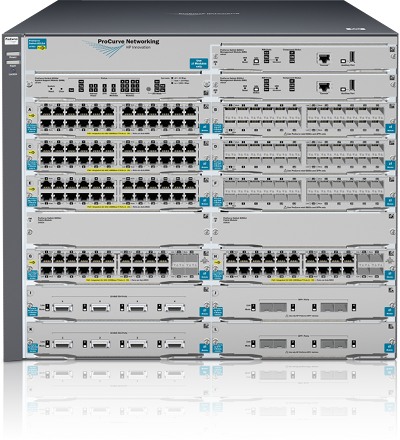
At the same time, we complained that the composite indexes in the SNMP tables in the system are not supported, which somewhat limits the application possibilities. For example, if you need to do Discovery of two RAID controllers on one server and all physical and logical drives behind them, then, alas, we could not do this without crutches. Worked only for the first RAID controller listed. But as they say, everything flows, everything changes! And here is the long-awaited release 2.2 removed this restriction that binds us by hand.
')
I would like to talk about innovation on the example of a template for HP servers. But first, let's remember a little about SNMP.
So what is LLD for SNMP?
This is the addition of data items based on rows in the SNMP table. Each line is one new data item based on the prototype. What is the SNMP table in general, how to find it among other SNMP objects in the MIB?
This is an object ( OBJECT-TYPE ), whose SYNTAX attribute is defined as SEQUENCE OF X, where X is the sequence of objects that describes the columns of the table. The rows of the table themselves are stored on the floor below in another object, and are distinguished from the table by the presence of INDEX ATTRIBUTE, a unique key used to identify the rows. What did I say? Better example.
Take the well-known ifTable table with interfaces from the IF-MIB, its MIB in the SNMP tree will look like this:
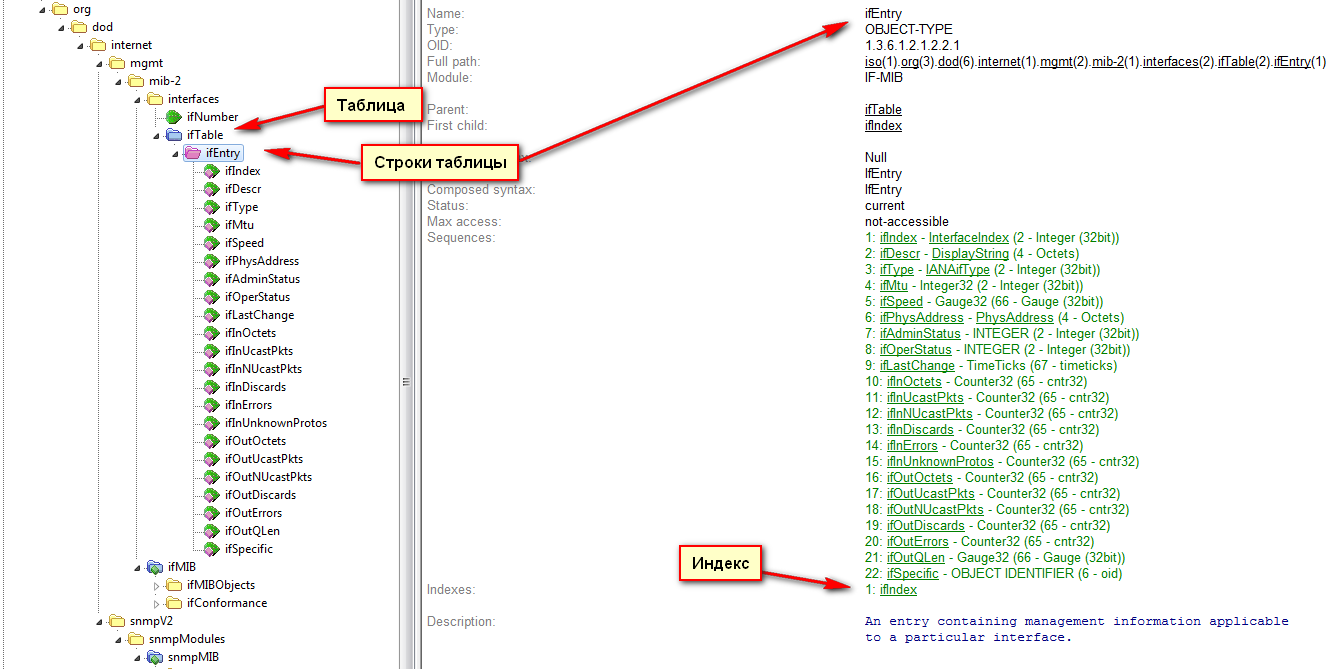
And the result of a query to such a table on any switch will look like this:
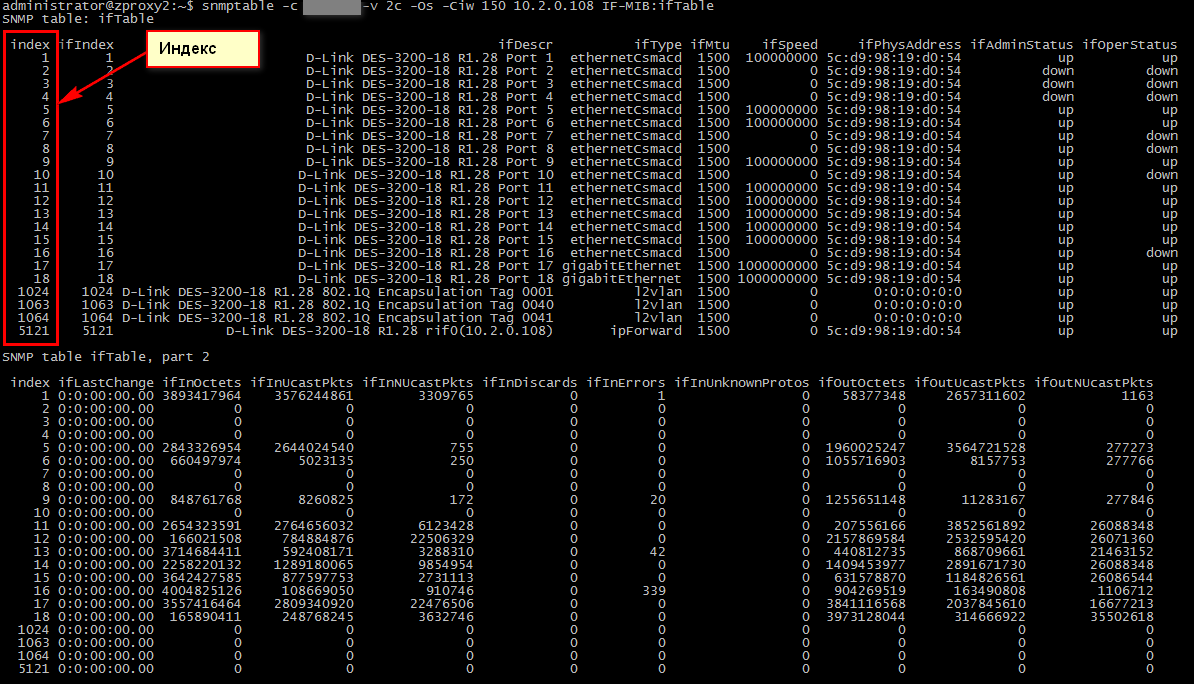
Moreover, index is an integral part of the OID, and just serves to distinguish the columns of one row of a table from another:
administrator @ zproxy2: ~ $ snmpwalk -c public -v 2c -On 10.2.0.108 IF-MIB: ifDescr
.1.3.6.1.2.1.2.2.1.2. 1 = STRING: D-Link DES-3200-18 R1.28 Port 1
.1.3.6.1.2.1.2.2.1.2. 2 = STRING: D-Link DES-3200-18 R1.28 Port 2
.1.3.6.1.2.1.2.2.1.2. 3 = STRING: D-Link DES-3200-18 R1.28 Port 3
.1.3.6.1.2.1.2.2.1.2. 4 = STRING: D-Link DES-3200-18 R1.28 Port 4
.1.3.6.1.2.1.2.2.1.2. 5 = STRING: D-Link DES-3200-18 R1.28 Port 5
.1.3.6.1.2.1.2.2.1.2. 6 = STRING: D-Link DES-3200-18 R1.28 Port 6
.1.3.6.1.2.1.2.2.1.2. 7 = STRING: D-Link DES-3200-18 R1.28 Port 7
.1.3.6.1.2.1.2.2.1.2. 8 = STRING: D-Link DES-3200-18 R1.28 Port 8
.1.3.6.1.2.1.2.2.1.2. 9 = STRING: D-Link DES-3200-18 R1.28 Port 9
.1.3.6.1.2.1.2.2.1.2. 10 = STRING: D-Link DES-3200-18 R1.28 Port 10
.1.3.6.1.2.1.2.2.1.2. 11 = STRING: D-Link DES-3200-18 R1.28 Port 11
.1.3.6.1.2.1.2.2.1.2. 12 = STRING: D-Link DES-3200-18 R1.28 Port 12
.1.3.6.1.2.1.2.2.1.2. 13 = STRING: D-Link DES-3200-18 R1.28 Port 13
.1.3.6.1.2.1.2.2.1.2. 14 = STRING: D-Link DES-3200-18 R1.28 Port 14
.1.3.6.1.2.1.2.2.1.2. 15 = STRING: D-Link DES-3200-18 R1.28 Port 15
.1.3.6.1.2.1.2.2.1.2. 16 = STRING: D-Link DES-3200-18 R1.28 Port 16
.1.3.6.1.2.1.2.2.1.2. 17 = STRING: D-Link DES-3200-18 R1.28 Port 17
.1.3.6.1.2.1.2.2.1.2. 18 = STRING: D-Link DES-3200-18 R1.28 Port 18
.1.3.6.1.2.1.2.2.1.2. 1024 = STRING: D-Link DES-3200-18 R1.28 802.1Q Encapsulation Tag 0001
.1.3.6.1.2.1.2.2.1.2. 1063 = STRING: D-Link DES-3200-18 R1.28 802.1Q Encapsulation Tag 0040
.1.3.6.1.2.1.2.2.1.2. 1064 = STRING: D-Link DES-3200-18 R1.28 802.1Q Encapsulation Tag 0041
.1.3.6.1.2.1.2.2.1.2. 5121 = STRING: D-Link DES-3200-18 R1.28 rif0 (10.2.0.108)
In IF-MIB: ifTable index is simple and equals one column in the table: ifIndex . Zabbix could find data elements in such tables at the time of the appearance of LLD, from version 2.0, and the detection of all available interfaces from the ifTable table is in the standard template . About the same how to configure LLD with simple indexes, we just wrote on Habré last time .
But in SNMP there are tables where the index is composite and looks more complicated than just a single figure. For example, the TCP-MIB table: tcpConnTable, in which all current connections are stored. In this table, the index is composite and consists of four objects:
Local IP Address. Local Port .Remote IP Address.Remote Port
Here they are in the MIB file:

But these indices when polling equipment:
administrator @ zproxy2: ~ $ snmptable -c public -v 2c -Os -Ciw 150 10.2.0.108 TCP-MIB: tcpConnTable
SNMP table: tcpConnTable
index tcpConnState tcpConnLocalAddress tcpConnLocalPort tcpConnRemAddress tcpConnRemPort
0.0.0.0. 22 .0.0.0.0.0 listen 0.0.0.0 22 0.0.0.0 0
0.0.0.0. 80 .0.0.0.0.0 listen 0.0.0.0 80 0.0.0.0 0
or if you are polling snmpwalk:
administrator @ zproxy2: ~ $ snmpwalk -c virton -v 2c -Os 10.2.0.108 TCP-MIB: tcpConnTable
tcpConnState.0.0.0.0. 22 .0.0.0.0.0 = INTEGER: listen (2)
tcpConnState.0.0.0.0. 80 .0.0.0.0.0 = INTEGER: listen (2)
tcpConnLocalAddress.0.0.0.0. 22 .0.0.0.0.0 = IpAddress: 0.0.0.0
tcpConnLocalAddress.0.0.0.0. 80 .0.0.0.0.0 = IpAddress: 0.0.0.0
tcpConnLocalPort.0.0.0.0. 22 .0.0.0.0.0 = INTEGER: 22
tcpConnLocalPort.0.0.0.0. 80 .0.0.0.0.0 = INTEGER: 80
tcpConnRemAddress.0.0.0.0. 22 .0.0.0.0.0 = IpAddress: 0.0.0.0
tcpConnRemAddress.0.0.0.0. 80 .0.0.0.0.0 = IpAddress: 0.0.0.0
tcpConnRemPort.0.0.0.0. 22 .0.0.0.0.0 = INTEGER: 0
tcpConnRemPort.0.0.0.0. 80 .0.0.0.0.0 = INTEGER: 0
Previously, such indexes were introduced Zabbix in a stupor. In 2.2 now we can monitor such tables. Let's look at a practical example.
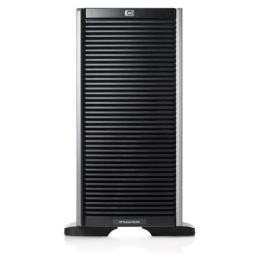
So, we have an HP Proliant server, and there are two RAID controllers in it. Among other things, about the system, we are interested in the state of all hard drives connected to the RAID controller.
To access this data, if we have a Windows or Linux OS, we need to install the HP Insight Management Agent, which will lay out this information for access via snmp. It will only pick up.
To understand what we pick up, refer to the MIB file. For RAID, this is CPQIDA-MIB, and for physical disks, this is the CPQIDA-MIB table: cpqDaPhyDrvTable. As we can see, the index here consists of two parts:
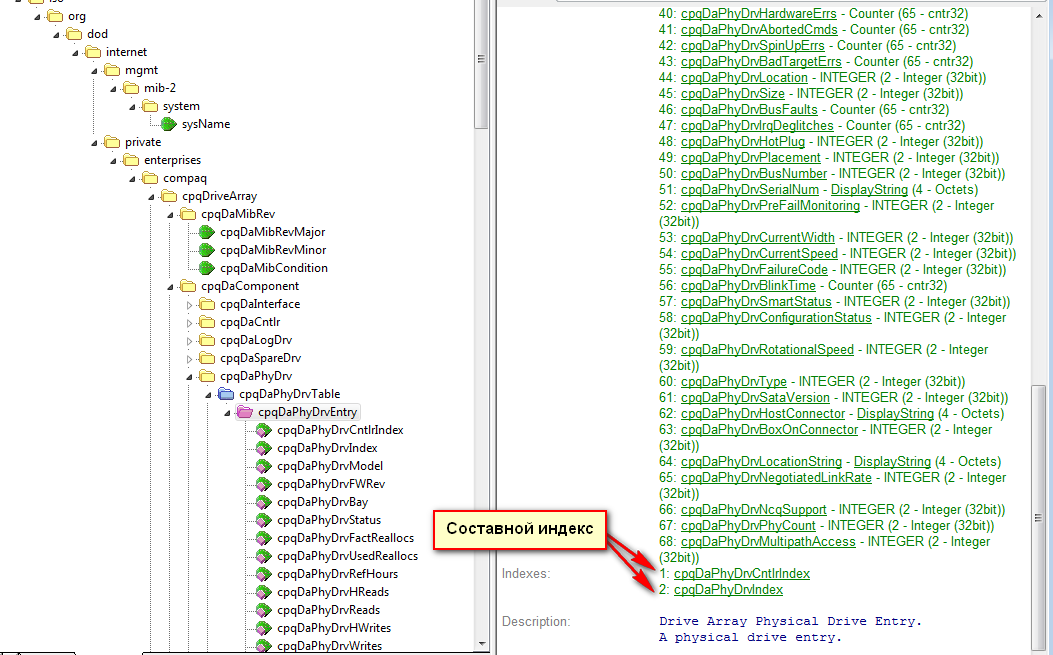
The first part of the index is the controller index.
The second part is the disk index
We interrogate the table, its column with the status of disks:
administrator @ zproxy2: ~ $ snmpwalk -c public -v 2c 192.168.0.22 1.3.6.1.4.1.232.3.2.5.1.1.5
iso.3.6.1.4.1.232.3.2.5.1.1.5. 1 . 0 = INTEGER: 1
iso.3.6.1.4.1.232.3.2.5.1.1.5. 1 . 1 = INTEGER: 2
iso.3.6.1.4.1.232.3.2.5.1.1.5. 1 . 2 = INTEGER: 3
iso.3.6.1.4.1.232.3.2.5.1.1.5. 1 . 3 = INTEGER: 4
iso.3.6.1.4.1.232.3.2.5.1.1.5. 4 1 = INTEGER: 5
iso.3.6.1.4.1.232.3.2.5.1.1.5. 4 2 = INTEGER: 6
iso.3.6.1.4.1.232.3.2.5.1.1.5. 4 3 = INTEGER: 7
iso.3.6.1.4.1.232.3.2.5.1.1.5. 4 4 = INTEGER: 8
We see that we have eight disks (cpqDaPhyDrvIndex) located on controllers under the subscripts 1 and 4 (cpqDaPhyCntlrIndex). In 2.0 through LLD there would be only the first four disks.
How to configure detection? Yes, just like LLD with regular indexes:
Step 1: First we create the detection in the template for HP:
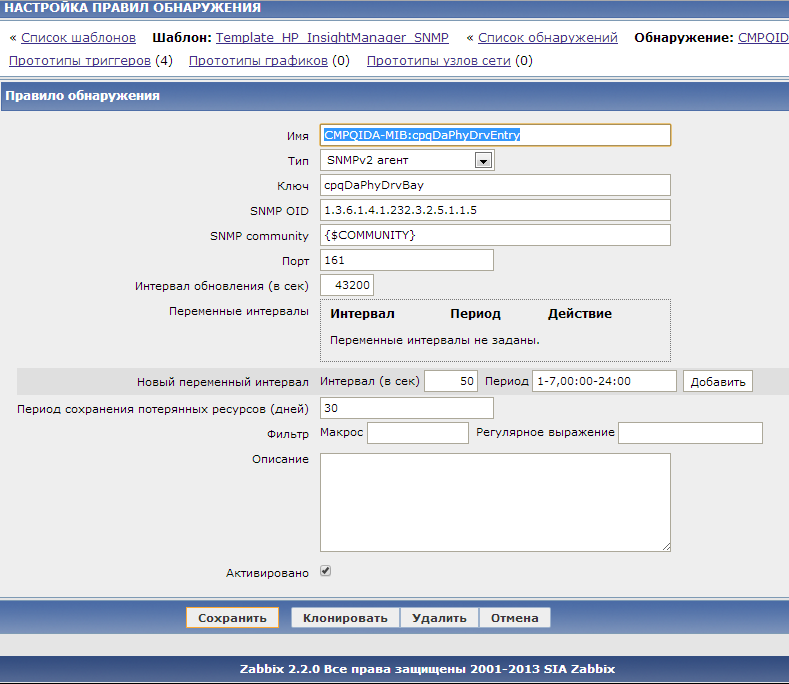
Step 2: Create a prototype data item
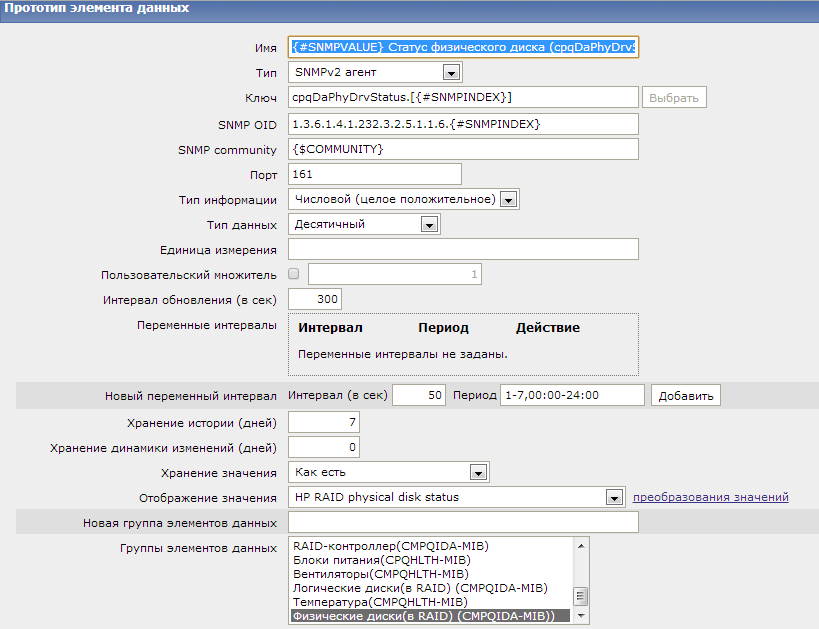
Step 3: Create a prototype trigger
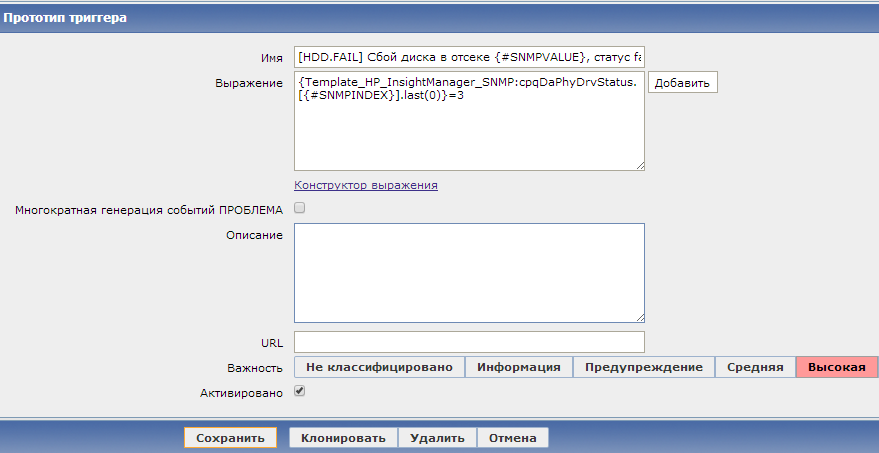
Further
Repeat steps 2.3 for other interesting columns in the physical disk table.
Items of data:
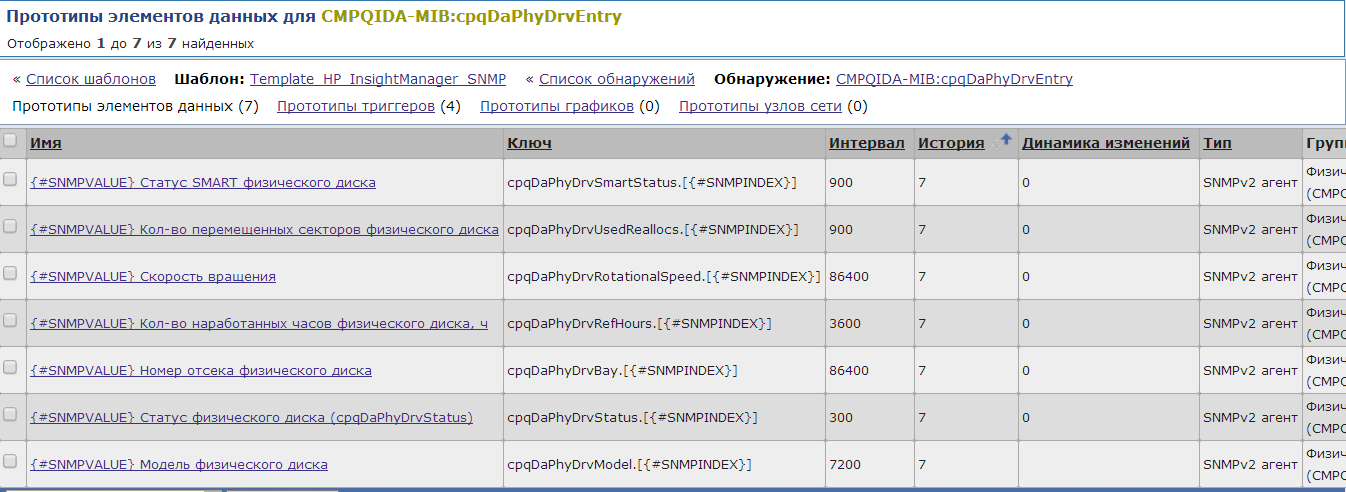
Triggers:

Repeat steps 1-3 for other interesting tables in the MIBs from HP, we get:
What the system will look like:

Step 4: Add our template to HP network nodes
Specify for them the value of the macro {$ COMMUNITY}, if it is different from public, waiting for the end of the LLD operation. The result will be seen in the section Latest data :
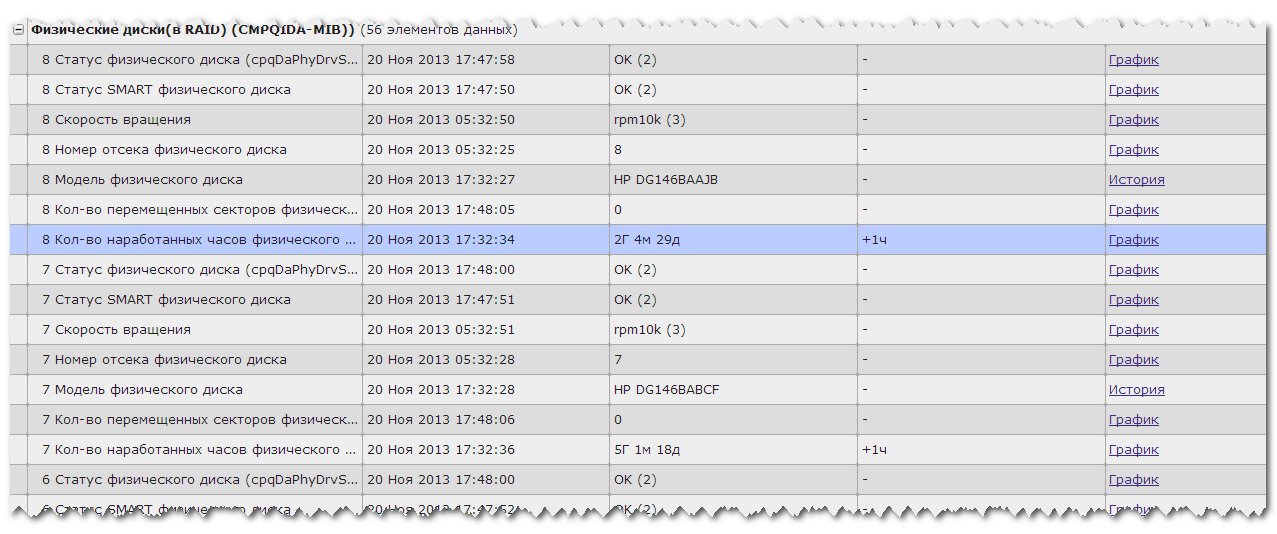
Now, when Zabbiks maintains composite SNMP indexes, the list of tables to which the LLD hand can reach is significantly expanded. And the more you use Low-level Discovery - the less you tune in Zabbiks hands. Handmade with LLD - set up prototypes in the template. But this needs to be done only once.
The author of the article is wabbit .

At the same time, we complained that the composite indexes in the SNMP tables in the system are not supported, which somewhat limits the application possibilities. For example, if you need to do Discovery of two RAID controllers on one server and all physical and logical drives behind them, then, alas, we could not do this without crutches. Worked only for the first RAID controller listed. But as they say, everything flows, everything changes! And here is the long-awaited release 2.2 removed this restriction that binds us by hand.
')
I would like to talk about innovation on the example of a template for HP servers. But first, let's remember a little about SNMP.
SNMP
So what is LLD for SNMP?
This is the addition of data items based on rows in the SNMP table. Each line is one new data item based on the prototype. What is the SNMP table in general, how to find it among other SNMP objects in the MIB?
This is an object ( OBJECT-TYPE ), whose SYNTAX attribute is defined as SEQUENCE OF X, where X is the sequence of objects that describes the columns of the table. The rows of the table themselves are stored on the floor below in another object, and are distinguished from the table by the presence of INDEX ATTRIBUTE, a unique key used to identify the rows. What did I say? Better example.
Take the well-known ifTable table with interfaces from the IF-MIB, its MIB in the SNMP tree will look like this:

And the result of a query to such a table on any switch will look like this:

Moreover, index is an integral part of the OID, and just serves to distinguish the columns of one row of a table from another:
administrator @ zproxy2: ~ $ snmpwalk -c public -v 2c -On 10.2.0.108 IF-MIB: ifDescr
.1.3.6.1.2.1.2.2.1.2. 1 = STRING: D-Link DES-3200-18 R1.28 Port 1
.1.3.6.1.2.1.2.2.1.2. 2 = STRING: D-Link DES-3200-18 R1.28 Port 2
.1.3.6.1.2.1.2.2.1.2. 3 = STRING: D-Link DES-3200-18 R1.28 Port 3
.1.3.6.1.2.1.2.2.1.2. 4 = STRING: D-Link DES-3200-18 R1.28 Port 4
.1.3.6.1.2.1.2.2.1.2. 5 = STRING: D-Link DES-3200-18 R1.28 Port 5
.1.3.6.1.2.1.2.2.1.2. 6 = STRING: D-Link DES-3200-18 R1.28 Port 6
.1.3.6.1.2.1.2.2.1.2. 7 = STRING: D-Link DES-3200-18 R1.28 Port 7
.1.3.6.1.2.1.2.2.1.2. 8 = STRING: D-Link DES-3200-18 R1.28 Port 8
.1.3.6.1.2.1.2.2.1.2. 9 = STRING: D-Link DES-3200-18 R1.28 Port 9
.1.3.6.1.2.1.2.2.1.2. 10 = STRING: D-Link DES-3200-18 R1.28 Port 10
.1.3.6.1.2.1.2.2.1.2. 11 = STRING: D-Link DES-3200-18 R1.28 Port 11
.1.3.6.1.2.1.2.2.1.2. 12 = STRING: D-Link DES-3200-18 R1.28 Port 12
.1.3.6.1.2.1.2.2.1.2. 13 = STRING: D-Link DES-3200-18 R1.28 Port 13
.1.3.6.1.2.1.2.2.1.2. 14 = STRING: D-Link DES-3200-18 R1.28 Port 14
.1.3.6.1.2.1.2.2.1.2. 15 = STRING: D-Link DES-3200-18 R1.28 Port 15
.1.3.6.1.2.1.2.2.1.2. 16 = STRING: D-Link DES-3200-18 R1.28 Port 16
.1.3.6.1.2.1.2.2.1.2. 17 = STRING: D-Link DES-3200-18 R1.28 Port 17
.1.3.6.1.2.1.2.2.1.2. 18 = STRING: D-Link DES-3200-18 R1.28 Port 18
.1.3.6.1.2.1.2.2.1.2. 1024 = STRING: D-Link DES-3200-18 R1.28 802.1Q Encapsulation Tag 0001
.1.3.6.1.2.1.2.2.1.2. 1063 = STRING: D-Link DES-3200-18 R1.28 802.1Q Encapsulation Tag 0040
.1.3.6.1.2.1.2.2.1.2. 1064 = STRING: D-Link DES-3200-18 R1.28 802.1Q Encapsulation Tag 0041
.1.3.6.1.2.1.2.2.1.2. 5121 = STRING: D-Link DES-3200-18 R1.28 rif0 (10.2.0.108)
In IF-MIB: ifTable index is simple and equals one column in the table: ifIndex . Zabbix could find data elements in such tables at the time of the appearance of LLD, from version 2.0, and the detection of all available interfaces from the ifTable table is in the standard template . About the same how to configure LLD with simple indexes, we just wrote on Habré last time .
But in SNMP there are tables where the index is composite and looks more complicated than just a single figure. For example, the TCP-MIB table: tcpConnTable, in which all current connections are stored. In this table, the index is composite and consists of four objects:
Local IP Address. Local Port .Remote IP Address.Remote Port
Here they are in the MIB file:

But these indices when polling equipment:
administrator @ zproxy2: ~ $ snmptable -c public -v 2c -Os -Ciw 150 10.2.0.108 TCP-MIB: tcpConnTable
SNMP table: tcpConnTable
index tcpConnState tcpConnLocalAddress tcpConnLocalPort tcpConnRemAddress tcpConnRemPort
0.0.0.0. 22 .0.0.0.0.0 listen 0.0.0.0 22 0.0.0.0 0
0.0.0.0. 80 .0.0.0.0.0 listen 0.0.0.0 80 0.0.0.0 0
or if you are polling snmpwalk:
administrator @ zproxy2: ~ $ snmpwalk -c virton -v 2c -Os 10.2.0.108 TCP-MIB: tcpConnTable
tcpConnState.0.0.0.0. 22 .0.0.0.0.0 = INTEGER: listen (2)
tcpConnState.0.0.0.0. 80 .0.0.0.0.0 = INTEGER: listen (2)
tcpConnLocalAddress.0.0.0.0. 22 .0.0.0.0.0 = IpAddress: 0.0.0.0
tcpConnLocalAddress.0.0.0.0. 80 .0.0.0.0.0 = IpAddress: 0.0.0.0
tcpConnLocalPort.0.0.0.0. 22 .0.0.0.0.0 = INTEGER: 22
tcpConnLocalPort.0.0.0.0. 80 .0.0.0.0.0 = INTEGER: 80
tcpConnRemAddress.0.0.0.0. 22 .0.0.0.0.0 = IpAddress: 0.0.0.0
tcpConnRemAddress.0.0.0.0. 80 .0.0.0.0.0 = IpAddress: 0.0.0.0
tcpConnRemPort.0.0.0.0. 22 .0.0.0.0.0 = INTEGER: 0
tcpConnRemPort.0.0.0.0. 80 .0.0.0.0.0 = INTEGER: 0
Previously, such indexes were introduced Zabbix in a stupor. In 2.2 now we can monitor such tables. Let's look at a practical example.
HP Insight Manager

So, we have an HP Proliant server, and there are two RAID controllers in it. Among other things, about the system, we are interested in the state of all hard drives connected to the RAID controller.
To access this data, if we have a Windows or Linux OS, we need to install the HP Insight Management Agent, which will lay out this information for access via snmp. It will only pick up.
To understand what we pick up, refer to the MIB file. For RAID, this is CPQIDA-MIB, and for physical disks, this is the CPQIDA-MIB table: cpqDaPhyDrvTable. As we can see, the index here consists of two parts:

The first part of the index is the controller index.
The second part is the disk index
We interrogate the table, its column with the status of disks:
administrator @ zproxy2: ~ $ snmpwalk -c public -v 2c 192.168.0.22 1.3.6.1.4.1.232.3.2.5.1.1.5
iso.3.6.1.4.1.232.3.2.5.1.1.5. 1 . 0 = INTEGER: 1
iso.3.6.1.4.1.232.3.2.5.1.1.5. 1 . 1 = INTEGER: 2
iso.3.6.1.4.1.232.3.2.5.1.1.5. 1 . 2 = INTEGER: 3
iso.3.6.1.4.1.232.3.2.5.1.1.5. 1 . 3 = INTEGER: 4
iso.3.6.1.4.1.232.3.2.5.1.1.5. 4 1 = INTEGER: 5
iso.3.6.1.4.1.232.3.2.5.1.1.5. 4 2 = INTEGER: 6
iso.3.6.1.4.1.232.3.2.5.1.1.5. 4 3 = INTEGER: 7
iso.3.6.1.4.1.232.3.2.5.1.1.5. 4 4 = INTEGER: 8
We see that we have eight disks (cpqDaPhyDrvIndex) located on controllers under the subscripts 1 and 4 (cpqDaPhyCntlrIndex). In 2.0 through LLD there would be only the first four disks.
How to configure detection? Yes, just like LLD with regular indexes:
Step 1: First we create the detection in the template for HP:

| Key | cpqDaPhyDrvBay |
| SNMP OID | OID of the column in the table that we will use to search for disks. We will use the OID 1.3.6.1.4.1.232.3.2.5.1.1.5, this is the column that contains the disk compartment number (cpqDaPhyDrvBay). The value of this column will be assigned to the special macro {#SNMPVALUE} , which we can use, for example, in the names of data elements or in the names of triggers |
| SNMP community | this example uses the {$ COMMUNITY} macro. The same template contains the default value, {$ COMMUNITY} = public. Further, for each specific network node to which we attach this template, we can either rewrite the value of the macro, if its SNMP community is different, or do nothing, and then it will be written in the public template. This technique helps to avoid the need to change items at the host level. |
| Filter | We can filter the resulting value of the special macro {#SNMPVALUE} by regex, or leave this field empty if nothing needs to be cut off. Since we started talking about macros, let me remind you that there are two of them in LLD via SNMP: {#SNMPINDEX} , {#SNMPVALUE} . And for each found line in the table, they will take values:  |
| Period of preservation of lost resources | After how many days to delete the item, when it stops being detected (the disk was pulled out and carried away). The default is 30 days. |
Step 2: Create a prototype data item

Step 3: Create a prototype trigger

Further
Repeat steps 2.3 for other interesting columns in the physical disk table.
Items of data:

Triggers:

Repeat steps 1-3 for other interesting tables in the MIBs from HP, we get:
| SNMP Table | What's interestnig | Table index |
|---|---|---|
| CMPQIDA-MIB: cpqDaCntlrTable | RAID Controller Status | Plain |
| CMPQIDA-MIB: cpqDaAccelTable | Status Array Accelerator, battery control | Plain |
| CMPQIDA-MIB: cpqDaCntlrPerfTable | RAID performance, RAID processor utilization | Composite |
| CMPQIDA-MIB: cpqDaLogDrvTable | Logical drive status | Composite |
| CMPQIDA-MIB: cpqDaLogDrvPerfTable | Logical drive performance | Composite |
| CMPQHLTH-MIB: cpqHeTemperatureTable | Temperature CPU, memory and other components | Composite |
| CMPQHLTH-MIB: cpqHeThermalFanTable | Fan status | Plain |
| CMPQHLTH-MIB: cpqHeFltTolPowerSupplyTable | Power Supply Status | Composite |

Step 4: Add our template to HP network nodes
Specify for them the value of the macro {$ COMMUNITY}, if it is different from public, waiting for the end of the LLD operation. The result will be seen in the section Latest data :

Total
Now, when Zabbiks maintains composite SNMP indexes, the list of tables to which the LLD hand can reach is significantly expanded. And the more you use Low-level Discovery - the less you tune in Zabbiks hands. Handmade with LLD - set up prototypes in the template. But this needs to be done only once.
PS
I attach the template for HP, suddenly someone is interested.
<?xml version="1.0" encoding="UTF-8"?> <zabbix_export> <version>2.0</version> <date>2013-11-20T14:22:01Z</date> <groups> <group> <name>Templates</name> </group> </groups> <templates> <template> <template>Template_HP_InsightManager_SNMP</template> <name>Template_HP_InsightManager_SNMP</name> <groups> <group> <name>Templates_Production</name> </group> </groups> <applications> <application> <name>CMPQHLTH-MIB</name> </application> <application> <name>CMPQIDA-MIB</name> </application> <application> <name>CPQSINFO-MIB</name> </application> <application> <name>HP Platform</name> </application> <application> <name>RAID-(Accelerator) (CMPQIDA-MIB)</name> </application> <application> <name>RAID-(CMPQIDA-MIB)</name> </application> <application> <name> (CPQHLTH-MIB)</name> </application> <application> <name>(CMPQHLTH-MIB)</name> </application> <application> <name> ( RAID) (CMPQIDA-MIB)</name> </application> <application> <name>(CMPQHLTH-MIB)</name> </application> <application> <name> ( RAID) (CMPQIDA-MIB))</name> </application> </applications> <items> <item> <name>HP Platform: C </name> <type>4</type> <snmp_community>{$COMMUNITY}</snmp_community> <multiplier>0</multiplier> <snmp_oid>.1.3.6.1.4.1.232.2.1.3.0</snmp_oid> <key>cpqSiMibCondition.0</key> <delay>300</delay> <history>90</history> <trends>30</trends> <status>0</status> <value_type>3</value_type> <allowed_hosts/> <units/> <delta>0</delta> <snmpv3_contextname/> <snmpv3_securityname/> <snmpv3_securitylevel>0</snmpv3_securitylevel> <snmpv3_authprotocol>0</snmpv3_authprotocol> <snmpv3_authpassphrase/> <snmpv3_privprotocol>0</snmpv3_privprotocol> <snmpv3_privpassphrase/> <formula>1</formula> <delay_flex/> <params/> <ipmi_sensor/> <data_type>0</data_type> <authtype>0</authtype> <username/> <password/> <publickey/> <privatekey/> <port>161</port> <description/> <inventory_link>0</inventory_link> <applications> <application> <name>HP Platform</name> </application> </applications> <valuemap> <name>HP RAID drive status</name> </valuemap> </item> <item> <name>HP Platform: MIB version (major)</name> <type>4</type> <snmp_community>{$COMMUNITY}</snmp_community> <multiplier>0</multiplier> <snmp_oid>.1.3.6.1.4.1.232.2.1.1.0</snmp_oid> <key>cpqSiMibRev.cpqSiMibRevMajor.0</key> <delay>86400</delay> <history>30</history> <trends>0</trends> <status>1</status> <value_type>3</value_type> <allowed_hosts>localhost</allowed_hosts> <units/> <delta>0</delta> <snmpv3_contextname/> <snmpv3_securityname/> <snmpv3_securitylevel>0</snmpv3_securitylevel> <snmpv3_authprotocol>0</snmpv3_authprotocol> <snmpv3_authpassphrase/> <snmpv3_privprotocol>0</snmpv3_privprotocol> <snmpv3_privpassphrase/> <formula>0</formula> <delay_flex/> <params/> <ipmi_sensor/> <data_type>0</data_type> <authtype>0</authtype> <username/> <password/> <publickey/> <privatekey/> <port>161</port> <description/> <inventory_link>0</inventory_link> <applications> <application> <name>CPQSINFO-MIB</name> </application> </applications> <valuemap/> </item> <item> <name>HP Platform: MIB version (minor)</name> <type>4</type> <snmp_community>{$COMMUNITY}</snmp_community> <multiplier>0</multiplier> <snmp_oid>.1.3.6.1.4.1.232.2.1.2.0</snmp_oid> <key>cpqSiMibRev.cpqSiMibRevMinor.0</key> <delay>86400</delay> <history>30</history> <trends>0</trends> <status>1</status> <value_type>3</value_type> <allowed_hosts>localhost</allowed_hosts> <units/> <delta>0</delta> <snmpv3_contextname/> <snmpv3_securityname/> <snmpv3_securitylevel>0</snmpv3_securitylevel> <snmpv3_authprotocol>0</snmpv3_authprotocol> <snmpv3_authpassphrase/> <snmpv3_privprotocol>0</snmpv3_privprotocol> <snmpv3_privpassphrase/> <formula>0</formula> <delay_flex/> <params/> <ipmi_sensor/> <data_type>0</data_type> <authtype>0</authtype> <username/> <password/> <publickey/> <privatekey/> <port>161</port> <description/> <inventory_link>0</inventory_link> <applications> <application> <name>CPQSINFO-MIB</name> </application> </applications> <valuemap/> </item> <item> <name>HP Platform: </name> <type>4</type> <snmp_community>{$COMMUNITY}</snmp_community> <multiplier>0</multiplier> <snmp_oid>.1.3.6.1.4.1.232.6.2.6.1.0</snmp_oid> <key>cpqHeThermalCondition.0</key> <delay>300</delay> <history>2</history> <trends>0</trends> <status>0</status> <value_type>3</value_type> <allowed_hosts/> <units/> <delta>0</delta> <snmpv3_contextname/> <snmpv3_securityname/> <snmpv3_securitylevel>0</snmpv3_securitylevel> <snmpv3_authprotocol>0</snmpv3_authprotocol> <snmpv3_authpassphrase/> <snmpv3_privprotocol>0</snmpv3_privprotocol> <snmpv3_privpassphrase/> <formula>1</formula> <delay_flex/> <params/> <ipmi_sensor/> <data_type>0</data_type> <authtype>0</authtype> <username/> <password/> <publickey/> <privatekey/> <port>161</port> <description/> <inventory_link>0</inventory_link> <applications> <application> <name>HP Platform</name> </application> </applications> <valuemap> <name>HP RAID drive status</name> </valuemap> </item> <item> <name>HP Platform: </name> <type>4</type> <snmp_community>{$COMMUNITY}</snmp_community> <multiplier>0</multiplier> <snmp_oid>.1.3.6.1.4.1.232.6.2.6.3.0</snmp_oid> <key>cpqHeThermalTempStatus</key> <delay>240</delay> <history>2</history> <trends>0</trends> <status>0</status> <value_type>3</value_type> <allowed_hosts/> <units/> <delta>0</delta> <snmpv3_contextname/> <snmpv3_securityname/> <snmpv3_securitylevel>0</snmpv3_securitylevel> <snmpv3_authprotocol>0</snmpv3_authprotocol> <snmpv3_authpassphrase/> <snmpv3_privprotocol>0</snmpv3_privprotocol> <snmpv3_privpassphrase/> <formula>1</formula> <delay_flex/> <params/> <ipmi_sensor/> <data_type>0</data_type> <authtype>0</authtype> <username/> <password/> <publickey/> <privatekey/> <port>161</port> <description/> <inventory_link>0</inventory_link> <applications> <application> <name>HP Platform</name> </application> </applications> <valuemap> <name>HP RAID drive status</name> </valuemap> </item> <item> <name>HP Platform: </name> <type>4</type> <snmp_community>{$COMMUNITY}</snmp_community> <multiplier>0</multiplier> <snmp_oid>.1.3.6.1.4.1.232.6.2.9.1.0</snmp_oid> <key>cpqHeFltTolPwrSupplyCondition</key> <delay>300</delay> <history>2</history> <trends>0</trends> <status>0</status> <value_type>3</value_type> <allowed_hosts/> <units/> <delta>0</delta> <snmpv3_contextname/> <snmpv3_securityname/> <snmpv3_securitylevel>0</snmpv3_securitylevel> <snmpv3_authprotocol>0</snmpv3_authprotocol> <snmpv3_authpassphrase/> <snmpv3_privprotocol>0</snmpv3_privprotocol> <snmpv3_privpassphrase/> <formula>1</formula> <delay_flex/> <params/> <ipmi_sensor/> <data_type>0</data_type> <authtype>0</authtype> <username/> <password/> <publickey/> <privatekey/> <port>161</port> <description/> <inventory_link>0</inventory_link> <applications> <application> <name> (CPQHLTH-MIB)</name> </application> </applications> <valuemap> <name>HP RAID drive status</name> </valuemap> </item> <item> <name>HP Platform: </name> <type>4</type> <snmp_community>{$COMMUNITY}</snmp_community> <multiplier>0</multiplier> <snmp_oid>.1.3.6.1.4.1.232.6.2.14.4.0</snmp_oid> <key>cpqHeResilentMemStatus.0</key> <delay>300</delay> <history>2</history> <trends>0</trends> <status>0</status> <value_type>3</value_type> <allowed_hosts/> <units/> <delta>0</delta> <snmpv3_contextname/> <snmpv3_securityname/> <snmpv3_securitylevel>0</snmpv3_securitylevel> <snmpv3_authprotocol>0</snmpv3_authprotocol> <snmpv3_authpassphrase/> <snmpv3_privprotocol>0</snmpv3_privprotocol> <snmpv3_privpassphrase/> <formula>1</formula> <delay_flex/> <params/> <ipmi_sensor/> <data_type>0</data_type> <authtype>0</authtype> <username/> <password/> <publickey/> <privatekey/> <port>161</port> <description/> <inventory_link>0</inventory_link> <applications> <application> <name>HP Platform</name> </application> </applications> <valuemap> <name>HP RAID drive status</name> </valuemap> </item> <item> <name>HP Platform: </name> <type>4</type> <snmp_community>{$COMMUNITY}</snmp_community> <multiplier>0</multiplier> <snmp_oid>.1.3.6.1.4.1.232.2.2.4.2.0</snmp_oid> <key>cpqSiProductName.0</key> <delay>86400</delay> <history>30</history> <trends>365</trends> <status>0</status> <value_type>4</value_type> <allowed_hosts/> <units/> <delta>0</delta> <snmpv3_contextname/> <snmpv3_securityname/> <snmpv3_securitylevel>0</snmpv3_securitylevel> <snmpv3_authprotocol>0</snmpv3_authprotocol> <snmpv3_authpassphrase/> <snmpv3_privprotocol>0</snmpv3_privprotocol> <snmpv3_privpassphrase/> <formula>1</formula> <delay_flex/> <params/> <ipmi_sensor/> <data_type>0</data_type> <authtype>0</authtype> <username/> <password/> <publickey/> <privatekey/> <port>161</port> <description/> <inventory_link>1</inventory_link> <applications> <application> <name>HP Platform</name> </application> </applications> <valuemap/> </item> <item> <name>HP Platform: </name> <type>4</type> <snmp_community>{$COMMUNITY}</snmp_community> <multiplier>0</multiplier> <snmp_oid>.1.3.6.1.4.1.232.2.2.2.1.0</snmp_oid> <key>cpqSiSysSerialNum.0</key> <delay>86400</delay> <history>30</history> <trends>365</trends> <status>0</status> <value_type>4</value_type> <allowed_hosts/> <units/> <delta>0</delta> <snmpv3_contextname/> <snmpv3_securityname/> <snmpv3_securitylevel>0</snmpv3_securitylevel> <snmpv3_authprotocol>0</snmpv3_authprotocol> <snmpv3_authpassphrase/> <snmpv3_privprotocol>0</snmpv3_privprotocol> <snmpv3_privpassphrase/> <formula>1</formula> <delay_flex/> <params/> <ipmi_sensor/> <data_type>0</data_type> <authtype>0</authtype> <username/> <password/> <publickey/> <privatekey/> <port>161</port> <description/> <inventory_link>8</inventory_link> <applications> <application> <name>HP Platform</name> </application> </applications> <valuemap/> </item> <item> <name>HP Platform: -</name> <type>4</type> <snmp_community>{$COMMUNITY}</snmp_community> <multiplier>0</multiplier> <snmp_oid>1.3.6.1.4.1.232.2.2.2.2.0</snmp_oid> <key>cpqSiFormFactor.0</key> <delay>60</delay> <history>7</history> <trends>0</trends> <status>0</status> <value_type>3</value_type> <allowed_hosts/> <units/> <delta>0</delta> <snmpv3_contextname/> <snmpv3_securityname/> <snmpv3_securitylevel>0</snmpv3_securitylevel> <snmpv3_authprotocol>0</snmpv3_authprotocol> <snmpv3_authpassphrase/> <snmpv3_privprotocol>0</snmpv3_privprotocol> <snmpv3_privpassphrase/> <formula>1</formula> <delay_flex/> <params/> <ipmi_sensor/> <data_type>0</data_type> <authtype>0</authtype> <username/> <password/> <publickey/> <privatekey/> <port>161</port> <description>Name: cpqSiFormFactor Type: OBJECT-TYPE OID: 1.3.6.1.4.1.232.2.2.2.2 Full path: iso(1).org(3).dod(6).internet(1).private(4).enterprises(1).compaq(232).cpqSystemInfo(2).cpqSiComponent(2).cpqSiAsset(2).cpqSiFormFactor(2) Module: CPQSINFO-MIB Parent: cpqSiAsset Previous sibling: cpqSiSysSerialNum Next sibling: cpqSiAssetTag Numerical syntax: Integer (32bit) Base syntax: INTEGER Composed syntax: INTEGER Status: mandatory Max access: read-write Value list: 1: unknown(1) 2: portable(2) 3: laptop(3) 4: desktop(4) 5: tower(5) 6: mini-tower(6) 7: rack-mount(7) Description: The form factor of the system. Setting this variable tounknown will fail.</description> <inventory_link>2</inventory_link> <applications> <application> <name>HP Platform</name> </application> </applications> <valuemap> <name>HP form factor</name> </valuemap> </item> </items> <discovery_rules> <discovery_rule> <name>CMPQHLTH-MIB:cpqHeFltTolPowerSupplyTable</name> <type>4</type> <snmp_community>{$COMMUNITY}</snmp_community> <snmp_oid>1.3.6.1.4.1.232.6.2.9.3.1.2</snmp_oid> <key>cpqHeFltTolPowerSupplyBay</key> <delay>86400</delay> <status>0</status> <allowed_hosts/> <snmpv3_contextname/> <snmpv3_securityname/> <snmpv3_securitylevel>0</snmpv3_securitylevel> <snmpv3_authprotocol>0</snmpv3_authprotocol> <snmpv3_authpassphrase/> <snmpv3_privprotocol>0</snmpv3_privprotocol> <snmpv3_privpassphrase/> <delay_flex/> <params/> <ipmi_sensor/> <authtype>0</authtype> <username/> <password/> <publickey/> <privatekey/> <port>161</port> <filter>:</filter> <lifetime>14</lifetime> <description/> <item_prototypes> <item_prototype> <name>{#SNMPVALUE} </name> <type>4</type> <snmp_community>{$COMMUNITY}</snmp_community> <multiplier>0</multiplier> <snmp_oid>1.3.6.1.4.1.232.6.2.9.3.1.5.{#SNMPINDEX}</snmp_oid> <key>cpqHeFltTolPowerSupplyStatus.[{#SNMPINDEX}]</key> <delay>90</delay> <history>30</history> <trends>0</trends> <status>0</status> <value_type>3</value_type> <allowed_hosts/> <units/> <delta>0</delta> <snmpv3_contextname/> <snmpv3_securityname/> <snmpv3_securitylevel>0</snmpv3_securitylevel> <snmpv3_authprotocol>0</snmpv3_authprotocol> <snmpv3_authpassphrase/> <snmpv3_privprotocol>0</snmpv3_privprotocol> <snmpv3_privpassphrase/> <formula>1</formula> <delay_flex/> <params/> <ipmi_sensor/> <data_type>0</data_type> <authtype>0</authtype> <username/> <password/> <publickey/> <privatekey/> <port>161</port> <description>Name: cpqHeFltTolPowerSupplyStatus Type: OBJECT-TYPE OID: 1.3.6.1.4.1.232.6.2.9.3.1.5 Full path: iso(1).org(3).dod(6).internet(1).private(4).enterprises(1).compaq(232).cpqHealth(6).cpqHeComponent(2).cpqHeFltTolPwrSupply(9).cpqHeFltTolPowerSupplyTable(3).cpqHeFltTolPowerSupplyEntry(1).cpqHeFltTolPowerSupplyStatus(5) Module: CPQHLTH-MIB Parent: cpqHeFltTolPowerSupplyEntry Previous sibling: cpqHeFltTolPowerSupplyCondition Next sibling: cpqHeFltTolPowerSupplyMainVoltage Numerical syntax: Integer (32bit) Base syntax: INTEGER Composed syntax: INTEGER Status: mandatory Max access: read-only Value list: 1: noError(1) 2: generalFailure(2) 3: bistFailure(3) 4: fanFailure(4) 5: tempFailure(5) 6: interlockOpen(6) 7: epromFailed(7) 8: vrefFailed(8) 9: dacFailed(9) 10: ramTestFailed(10) 11: voltageChannelFailed(11) 12: orringdiodeFailed(12) 13: brownOut(13) 14: giveupOnStartup(14) 15: nvramInvalid(15) 16: calibrationTableInvalid(16) Description: The status of the power supply.</description> <inventory_link>0</inventory_link> <applications> <application> <name> (CPQHLTH-MIB)</name> </application> </applications> <valuemap> <name>HP PSU Status</name> </valuemap> </item_prototype> </item_prototypes> <trigger_prototypes> <trigger_prototype> <expression>{Template_HP_InsightManager_SNMP:cpqHeFltTolPowerSupplyStatus.[{#SNMPINDEX}].last(0)}=3</expression> <name>[PSU] bistFailure(3) {#SNMPVALUE}</name> <url/> <status>0</status> <priority>2</priority> <description/> <type>0</type> </trigger_prototype> <trigger_prototype> <expression>{Template_HP_InsightManager_SNMP:cpqHeFltTolPowerSupplyStatus.[{#SNMPINDEX}].last(0)}>5</expression> <name>[PSU] {#SNMPVALUE}</name> <url/> <status>0</status> <priority>4</priority> <description/> <type>0</type> </trigger_prototype> <trigger_prototype> <expression>{Template_HP_InsightManager_SNMP:cpqHeFltTolPowerSupplyStatus.[{#SNMPINDEX}].last()}=4</expression> <name>[PSU] {#SNMPVALUE}</name> <url/> <status>0</status> <priority>3</priority> <description/> <type>0</type> </trigger_prototype> <trigger_prototype> <expression>{Template_HP_InsightManager_SNMP:cpqHeFltTolPowerSupplyStatus.[{#SNMPINDEX}].last(0)}=2</expression> <name>[PSU] {#SNMPVALUE}</name> <url/> <status>0</status> <priority>4</priority> <description/> <type>0</type> </trigger_prototype> <trigger_prototype> <expression>{Template_HP_InsightManager_SNMP:cpqHeFltTolPowerSupplyStatus.[{#SNMPINDEX}].last()}=5</expression> <name>[PSU] {#SNMPVALUE}</name> <url/> <status>0</status> <priority>4</priority> <description/> <type>0</type> </trigger_prototype> </trigger_prototypes> <graph_prototypes/> <host_prototypes/> </discovery_rule> <discovery_rule> <name>CMPQHLTH-MIB:cpqHeTemperatureTable</name> <type>4</type> <snmp_community>{$COMMUNITY}</snmp_community> <snmp_oid>.1.3.6.1.4.1.232.6.2.6.8.1.1</snmp_oid> <key>cpqHeTemperatureChassis</key> <delay>43200</delay> <status>0</status> <allowed_hosts/> <snmpv3_contextname/> <snmpv3_securityname/> <snmpv3_securitylevel>0</snmpv3_securitylevel> <snmpv3_authprotocol>0</snmpv3_authprotocol> <snmpv3_authpassphrase/> <snmpv3_privprotocol>0</snmpv3_privprotocol> <snmpv3_privpassphrase/> <delay_flex/> <params/> <ipmi_sensor/> <authtype>0</authtype> <username/> <password/> <publickey/> <privatekey/> <port>161</port> <filter>:</filter> <lifetime>30</lifetime> <description/> <item_prototypes> <item_prototype> <name>{#SNMPINDEX} </name> <type>4</type> <snmp_community>{$COMMUNITY}</snmp_community> <multiplier>0</multiplier> <snmp_oid>.1.3.6.1.4.1.232.6.2.6.8.1.4.{#SNMPINDEX}</snmp_oid> <key>cpqHeTemperatureCelsius.[{#SNMPINDEX}]</key> <delay>300</delay> <history>7</history> <trends>30</trends> <status>0</status> <value_type>3</value_type> <allowed_hosts/> <units>C</units> <delta>0</delta> <snmpv3_contextname/> <snmpv3_securityname/> <snmpv3_securitylevel>0</snmpv3_securitylevel> <snmpv3_authprotocol>0</snmpv3_authprotocol> <snmpv3_authpassphrase/> <snmpv3_privprotocol>0</snmpv3_privprotocol> <snmpv3_privpassphrase/> <formula>1</formula> <delay_flex/> <params/> <ipmi_sensor/> <data_type>0</data_type> <authtype>0</authtype> <username/> <password/> <publickey/> <privatekey/> <port>161</port> <description/> <inventory_link>0</inventory_link> <applications> <application> <name>(CMPQHLTH-MIB)</name> </application> </applications> <valuemap/> </item_prototype> <item_prototype> <name>{#SNMPINDEX} </name> <type>4</type> <snmp_community>{$COMMUNITY}</snmp_community> <multiplier>0</multiplier> <snmp_oid>.1.3.6.1.4.1.232.6.2.6.8.1.3.{#SNMPINDEX}</snmp_oid> <key>cpqHeTemperatureLocale.[{#SNMPINDEX}]</key> <delay>7200</delay> <history>7</history> <trends>0</trends> <status>0</status> <value_type>3</value_type> <allowed_hosts/> <units/> <delta>0</delta> <snmpv3_contextname/> <snmpv3_securityname/> <snmpv3_securitylevel>0</snmpv3_securitylevel> <snmpv3_authprotocol>0</snmpv3_authprotocol> <snmpv3_authpassphrase/> <snmpv3_privprotocol>0</snmpv3_privprotocol> <snmpv3_privpassphrase/> <formula>1</formula> <delay_flex/> <params/> <ipmi_sensor/> <data_type>0</data_type> <authtype>0</authtype> <username/> <password/> <publickey/> <privatekey/> <port>161</port> <description/> <inventory_link>0</inventory_link> <applications> <application> <name>(CMPQHLTH-MIB)</name> </application> </applications> <valuemap> <name>HP T sensors locale</name> </valuemap> </item_prototype> <item_prototype> <name>{#SNMPINDEX} </name> <type>4</type> <snmp_community>{$COMMUNITY}</snmp_community> <multiplier>0</multiplier> <snmp_oid>.1.3.6.1.4.1.232.6.2.6.8.1.6.{#SNMPINDEX}</snmp_oid> <key>cpqHeTemperatureCondition.[{#SNMPINDEX}]</key> <delay>120</delay> <history>7</history> <trends>0</trends> <status>0</status> <value_type>3</value_type> <allowed_hosts/> <units/> <delta>0</delta> <snmpv3_contextname/> <snmpv3_securityname/> <snmpv3_securitylevel>0</snmpv3_securitylevel> <snmpv3_authprotocol>0</snmpv3_authprotocol> <snmpv3_authpassphrase/> <snmpv3_privprotocol>0</snmpv3_privprotocol> <snmpv3_privpassphrase/> <formula>1</formula> <delay_flex/> <params/> <ipmi_sensor/> <data_type>0</data_type> <authtype>0</authtype> <username/> <password/> <publickey/> <privatekey/> <port>161</port> <description/> <inventory_link>0</inventory_link> <applications> <application> <name>(CMPQHLTH-MIB)</name> </application> </applications> <valuemap> <name>HP RAID drive status</name> </valuemap> </item_prototype> </item_prototypes> <trigger_prototypes> <trigger_prototype> <expression>{Template_HP_InsightManager_SNMP:cpqHeTemperatureCondition.[{#SNMPINDEX}].last(0)}=3</expression> <name>[TEMP] {#SNMPINDEX} </name> <url/> <status>0</status> <priority>3</priority> <description></description> <type>0</type> </trigger_prototype> <trigger_prototype> <expression>{Template_HP_InsightManager_SNMP:cpqHeTemperatureCelsius.[{#SNMPINDEX}].last(0)}>40</expression> <name>[TEMP] {#SNMPINDEX} {ITEM.LASTVALUE}</name> <url/> <status>1</status> <priority>2</priority> <description></description> <type>0</type> </trigger_prototype> <trigger_prototype> <expression>{Template_HP_InsightManager_SNMP:cpqHeTemperatureCondition.[{#SNMPINDEX}].last(0)}=4</expression> <name>[TEMP] {#SNMPINDEX} </name> <url/> <status>0</status> <priority>4</priority> <description></description> <type>0</type> </trigger_prototype> <trigger_prototype> <expression>{Template_HP_InsightManager_SNMP:cpqHeTemperatureCelsius.[{#SNMPINDEX}].last(0)}>60</expression> <name>[TEMP] {#SNMPINDEX} ! {ITEM.LASTVALUE}</name> <url/> <status>1</status> <priority>4</priority> <description></description> <type>0</type> </trigger_prototype> </trigger_prototypes> <graph_prototypes> <graph_prototype> <name>HP [TESTING]</name> <width>900</width> <height>200</height> <yaxismin>0.0000</yaxismin> <yaxismax>100.0000</yaxismax> <show_work_period>1</show_work_period> <show_triggers>1</show_triggers> <type>0</type> <show_legend>1</show_legend> <show_3d>0</show_3d> <percent_left>0.0000</percent_left> <percent_right>0.0000</percent_right> <ymin_type_1>0</ymin_type_1> <ymax_type_1>0</ymax_type_1> <ymin_item_1>0</ymin_item_1> <ymax_item_1>0</ymax_item_1> <graph_items> <graph_item> <sortorder>0</sortorder> <drawtype>0</drawtype> <color>C80000</color> <yaxisside>0</yaxisside> <calc_fnc>2</calc_fnc> <type>0</type> <item> <host>Template_HP_InsightManager_SNMP</host> <key>cpqHeTemperatureCelsius.[{#SNMPINDEX}]</key> </item> </graph_item> </graph_items> </graph_prototype> </graph_prototypes> <host_prototypes/> </discovery_rule> <discovery_rule> <name>CMPQHLTH-MIB:cpqHeThermalFanTable</name> <type>4</type> <snmp_community>{$COMMUNITY}</snmp_community> <snmp_oid>1.3.6.1.4.1.232.6.2.6.6.1.1</snmp_oid> <key>cpqHeThermalFanIndex</key> <delay>43200</delay> <status>0</status> <allowed_hosts/> <snmpv3_contextname/> <snmpv3_securityname/> <snmpv3_securitylevel>0</snmpv3_securitylevel> <snmpv3_authprotocol>0</snmpv3_authprotocol> <snmpv3_authpassphrase/> <snmpv3_privprotocol>0</snmpv3_privprotocol> <snmpv3_privpassphrase/> <delay_flex/> <params/> <ipmi_sensor/> <authtype>0</authtype> <username/> <password/> <publickey/> <privatekey/> <port>161</port> <filter>:</filter> <lifetime>30</lifetime> <description/> <item_prototypes> <item_prototype> <name>{#SNMPINDEX} </name> <type>4</type> <snmp_community>{$COMMUNITY}</snmp_community> <multiplier>0</multiplier> <snmp_oid>1.3.6.1.4.1.232.6.2.6.6.1.3.{#SNMPINDEX}</snmp_oid> <key>cpqHeThermalFanPresent.[{#SNMPINDEX}]</key> <delay>86400</delay> <history>7</history> <trends>0</trends> <status>0</status> <value_type>3</value_type> <allowed_hosts/> <units/> <delta>0</delta> <snmpv3_contextname/> <snmpv3_securityname/> <snmpv3_securitylevel>0</snmpv3_securitylevel> <snmpv3_authprotocol>0</snmpv3_authprotocol> <snmpv3_authpassphrase/> <snmpv3_privprotocol>0</snmpv3_privprotocol> <snmpv3_privpassphrase/> <formula>1</formula> <delay_flex/> <params/> <ipmi_sensor/> <data_type>0</data_type> <authtype>0</authtype> <username/> <password/> <publickey/> <privatekey/> <port>161</port> <description>cpqHeThermalFanStatus Type: OBJECT-TYPE OID: 1.3.6.1.4.1.232.6.2.6.6.1.5 Full path: iso(1).org(3).dod(6).internet(1).private(4).enterprises(1).compaq(232).cpqHealth(6).cpqHeComponent(2).cpqHeThermal(6).cpqHeThermalFanTable(6).cpqHeThermalFanEntry(1).cpqHeThermalFanStatus(5) Module: CPQHLTH-MIB Parent: cpqHeThermalFanEntry Prev sibling: cpqHeThermalFanCpuFan Next sibling: cpqHeThermalFanHwLocation Numerical syntax: Integer (32 bit) Base syntax: INTEGER Composed syntax: INTEGER Status: mandatory Max access: read-only Value list: 1: other(1) 2: ok(2) 3: failed(4) Description: This specifies if the fan described is operating properly. This value will be one of the following: other(1) Fan status detection is not supported by this system or driver. ok(2) The fan is operating properly. failed(4) The fan is not operating properly.</description> <inventory_link>0</inventory_link> <applications> <application> <name>(CMPQHLTH-MIB)</name> </application> </applications> <valuemap> <name>HP Fan Present</name> </valuemap> </item_prototype> <item_prototype> <name>{#SNMPINDEX} </name> <type>4</type> <snmp_community>{$COMMUNITY}</snmp_community> <multiplier>0</multiplier> <snmp_oid>1.3.6.1.4.1.232.6.2.6.6.1.7.{#SNMPINDEX}</snmp_oid> <key>cpqHeThermalFanCurrentSpeed.[{#SNMPINDEX}]</key> <delay>600</delay> <history>7</history> <trends>0</trends> <status>0</status> <value_type>3</value_type> <allowed_hosts/> <units>rpm</units> <delta>0</delta> <snmpv3_contextname/> <snmpv3_securityname/> <snmpv3_securitylevel>0</snmpv3_securitylevel> <snmpv3_authprotocol>0</snmpv3_authprotocol> <snmpv3_authpassphrase/> <snmpv3_privprotocol>0</snmpv3_privprotocol> <snmpv3_privpassphrase/> <formula>1</formula> <delay_flex/> <params/> <ipmi_sensor/> <data_type>0</data_type> <authtype>0</authtype> <username/> <password/> <publickey/> <privatekey/> <port>161</port> <description>cpqHeThermalFanStatus Type: OBJECT-TYPE OID: 1.3.6.1.4.1.232.6.2.6.6.1.5 Full path: iso(1).org(3).dod(6).internet(1).private(4).enterprises(1).compaq(232).cpqHealth(6).cpqHeComponent(2).cpqHeThermal(6).cpqHeThermalFanTable(6).cpqHeThermalFanEntry(1).cpqHeThermalFanStatus(5) Module: CPQHLTH-MIB Parent: cpqHeThermalFanEntry Prev sibling: cpqHeThermalFanCpuFan Next sibling: cpqHeThermalFanHwLocation Numerical syntax: Integer (32 bit) Base syntax: INTEGER Composed syntax: INTEGER Status: mandatory Max access: read-only Value list: 1: other(1) 2: ok(2) 3: failed(4) Description: This specifies if the fan described is operating properly. This value will be one of the following: other(1) Fan status detection is not supported by this system or driver. ok(2) The fan is operating properly. failed(4) The fan is not operating properly.</description> <inventory_link>0</inventory_link> <applications> <application> <name>(CMPQHLTH-MIB)</name> </application> </applications> <valuemap/> </item_prototype> <item_prototype> <name>{#SNMPINDEX} </name> <type>4</type> <snmp_community>{$COMMUNITY}</snmp_community> <multiplier>0</multiplier> <snmp_oid>1.3.6.1.4.1.232.6.2.6.6.1.5.{#SNMPINDEX}</snmp_oid> <key>cpqHeThermalFanStatus.[{#SNMPINDEX}]</key> <delay>180</delay> <history>30</history> <trends>0</trends> <status>0</status> <value_type>3</value_type> <allowed_hosts/> <units/> <delta>0</delta> <snmpv3_contextname/> <snmpv3_securityname/> <snmpv3_securitylevel>0</snmpv3_securitylevel> <snmpv3_authprotocol>0</snmpv3_authprotocol> <snmpv3_authpassphrase/> <snmpv3_privprotocol>0</snmpv3_privprotocol> <snmpv3_privpassphrase/> <formula>1</formula> <delay_flex/> <params/> <ipmi_sensor/> <data_type>0</data_type> <authtype>0</authtype> <username/> <password/> <publickey/> <privatekey/> <port>161</port> <description>cpqHeThermalFanStatus Type: OBJECT-TYPE OID: 1.3.6.1.4.1.232.6.2.6.6.1.5 Full path: iso(1).org(3).dod(6).internet(1).private(4).enterprises(1).compaq(232).cpqHealth(6).cpqHeComponent(2).cpqHeThermal(6).cpqHeThermalFanTable(6).cpqHeThermalFanEntry(1).cpqHeThermalFanStatus(5) Module: CPQHLTH-MIB Parent: cpqHeThermalFanEntry Prev sibling: cpqHeThermalFanCpuFan Next sibling: cpqHeThermalFanHwLocation Numerical syntax: Integer (32 bit) Base syntax: INTEGER Composed syntax: INTEGER Status: mandatory Max access: read-only Value list: 1: other(1) 2: ok(2) 3: failed(4) Description: This specifies if the fan described is operating properly. This value will be one of the following: other(1) Fan status detection is not supported by this system or driver. ok(2) The fan is operating properly. failed(4) The fan is not operating properly.</description> <inventory_link>0</inventory_link> <applications> <application> <name>(CMPQHLTH-MIB)</name> </application> </applications> <valuemap> <name>HP RAID SMART status</name> </valuemap> </item_prototype> <item_prototype> <name>{#SNMPINDEX} </name> <type>4</type> <snmp_community>{$COMMUNITY}</snmp_community> <multiplier>0</multiplier> <snmp_oid>1.3.6.1.4.1.232.6.2.6.6.1.4.{#SNMPINDEX}</snmp_oid> <key>cpqHeThermalFanCpuFan.[{#SNMPINDEX}]</key> <delay>86400</delay> <history>7</history> <trends>0</trends> <status>0</status> <value_type>3</value_type> <allowed_hosts/> <units/> <delta>0</delta> <snmpv3_contextname/> <snmpv3_securityname/> <snmpv3_securitylevel>0</snmpv3_securitylevel> <snmpv3_authprotocol>0</snmpv3_authprotocol> <snmpv3_authpassphrase/> <snmpv3_privprotocol>0</snmpv3_privprotocol> <snmpv3_privpassphrase/> <formula>1</formula> <delay_flex/> <params/> <ipmi_sensor/> <data_type>0</data_type> <authtype>0</authtype> <username/> <password/> <publickey/> <privatekey/> <port>161</port> <description>cpqHeThermalFanStatus Type: OBJECT-TYPE OID: 1.3.6.1.4.1.232.6.2.6.6.1.5 Full path: iso(1).org(3).dod(6).internet(1).private(4).enterprises(1).compaq(232).cpqHealth(6).cpqHeComponent(2).cpqHeThermal(6).cpqHeThermalFanTable(6).cpqHeThermalFanEntry(1).cpqHeThermalFanStatus(5) Module: CPQHLTH-MIB Parent: cpqHeThermalFanEntry Prev sibling: cpqHeThermalFanCpuFan Next sibling: cpqHeThermalFanHwLocation Numerical syntax: Integer (32 bit) Base syntax: INTEGER Composed syntax: INTEGER Status: mandatory Max access: read-only Value list: 1: other(1) 2: ok(2) 3: failed(4) Description: This specifies if the fan described is operating properly. This value will be one of the following: other(1) Fan status detection is not supported by this system or driver. ok(2) The fan is operating properly. failed(4) The fan is not operating properly.</description> <inventory_link>0</inventory_link> <applications> <application> <name>(CMPQHLTH-MIB)</name> </application> </applications> <valuemap> <name>HP Fan Type</name> </valuemap> </item_prototype> </item_prototypes> <trigger_prototypes> <trigger_prototype> <expression>{Template_HP_InsightManager_SNMP:cpqHeThermalFanStatus.[{#SNMPINDEX}].last(0)}=4</expression> <name>[TEMP.FAN] {#SNMPINDEX} </name> <url/> <status>0</status> <priority>3</priority> <description/> <type>0</type> </trigger_prototype> </trigger_prototypes> <graph_prototypes/> <host_prototypes/> </discovery_rule> <discovery_rule> <name>CMPQIDA-MIB:cpqDaAccelTable</name> <type>4</type> <snmp_community>{$COMMUNITY}</snmp_community> <snmp_oid>1.3.6.1.4.1.232.3.2.2.2.1.1</snmp_oid> <key>cpqDaAccelCntlrIndex</key> <delay>43200</delay> <status>0</status> <allowed_hosts/> <snmpv3_contextname/> <snmpv3_securityname/> <snmpv3_securitylevel>0</snmpv3_securitylevel> <snmpv3_authprotocol>0</snmpv3_authprotocol> <snmpv3_authpassphrase/> <snmpv3_privprotocol>0</snmpv3_privprotocol> <snmpv3_privpassphrase/> <delay_flex/> <params/> <ipmi_sensor/> <authtype>0</authtype> <username/> <password/> <publickey/> <privatekey/> <port>161</port> <filter>:</filter> <lifetime>30</lifetime> <description>Array Accelerator Board Controller Index. This value is a logical number whose meaning is OS dependent. The value has a direct mapping to the controller table index such that controller 'i' has accelerator table entry 'i'</description> <item_prototypes> <item_prototype> <name>{#SNMPINDEX} Accelator Board </name> <type>4</type> <snmp_community>{$COMMUNITY}</snmp_community> <multiplier>0</multiplier> <snmp_oid>1.3.6.1.4.1.232.3.2.2.2.1.5.{#SNMPINDEX}</snmp_oid> <key>cpqDaAccelErrCode.["{#SNMPINDEX}"]</key> <delay>180</delay> <history>30</history> <trends>0</trends> <status>0</status> <value_type>3</value_type> <allowed_hosts/> <units/> <delta>0</delta> <snmpv3_contextname/> <snmpv3_securityname/> <snmpv3_securitylevel>0</snmpv3_securitylevel> <snmpv3_authprotocol>0</snmpv3_authprotocol> <snmpv3_authpassphrase/> <snmpv3_privprotocol>0</snmpv3_privprotocol> <snmpv3_privpassphrase/> <formula>1</formula> <delay_flex/> <params/> <ipmi_sensor/> <data_type>0</data_type> <authtype>0</authtype> <username/> <password/> <publickey/> <privatekey/> <port>161</port> <description/> <inventory_link>0</inventory_link> <applications> <application> <name>RAID-(Accelerator) (CMPQIDA-MIB)</name> </application> </applications> <valuemap> <name>HP AB Error code</name> </valuemap> </item_prototype> <item_prototype> <name>{#SNMPINDEX} Accelator Board (cpqDaAccelCondition)</name> <type>4</type> <snmp_community>{$COMMUNITY}</snmp_community> <multiplier>0</multiplier> <snmp_oid>1.3.6.1.4.1.232.3.2.2.2.1.9.{#SNMPINDEX}</snmp_oid> <key>cpqDaAccelCondition.["{#SNMPINDEX}"]</key> <delay>180</delay> <history>30</history> <trends>0</trends> <status>0</status> <value_type>3</value_type> <allowed_hosts/> <units/> <delta>0</delta> <snmpv3_contextname/> <snmpv3_securityname/> <snmpv3_securitylevel>0</snmpv3_securitylevel> <snmpv3_authprotocol>0</snmpv3_authprotocol> <snmpv3_authpassphrase/> <snmpv3_privprotocol>0</snmpv3_privprotocol> <snmpv3_privpassphrase/> <formula>1</formula> <delay_flex/> <params/> <ipmi_sensor/> <data_type>0</data_type> <authtype>0</authtype> <username/> <password/> <publickey/> <privatekey/> <port>161</port> <description/> <inventory_link>0</inventory_link> <applications> <application> <name>RAID-(Accelerator) (CMPQIDA-MIB)</name> </application> </applications> <valuemap> <name>HP RAID drive status</name> </valuemap> </item_prototype> <item_prototype> <name>{#SNMPINDEX} Accelator Board </name> <type>4</type> <snmp_community>{$COMMUNITY}</snmp_community> <multiplier>0</multiplier> <snmp_oid>1.3.6.1.4.1.232.3.2.2.2.1.2.{#SNMPINDEX}</snmp_oid> <key>cpqDaAccelStatus.["{#SNMPINDEX}"]</key> <delay>180</delay> <history>30</history> <trends>0</trends> <status>0</status> <value_type>3</value_type> <allowed_hosts/> <units/> <delta>0</delta> <snmpv3_contextname/> <snmpv3_securityname/> <snmpv3_securitylevel>0</snmpv3_securitylevel> <snmpv3_authprotocol>0</snmpv3_authprotocol> <snmpv3_authpassphrase/> <snmpv3_privprotocol>0</snmpv3_privprotocol> <snmpv3_privpassphrase/> <formula>1</formula> <delay_flex/> <params/> <ipmi_sensor/> <data_type>0</data_type> <authtype>0</authtype> <username/> <password/> <publickey/> <privatekey/> <port>161</port> <description/> <inventory_link>0</inventory_link> <applications> <application> <name>RAID-(Accelerator) (CMPQIDA-MIB)</name> </application> </applications> <valuemap> <name>HP AB Controller Statua</name> </valuemap> </item_prototype> </item_prototypes> <trigger_prototypes> <trigger_prototype> <expression>{Template_HP_InsightManager_SNMP:cpqDaAccelCondition.["{#SNMPINDEX}"].last(0)}=3</expression> <name>[RAID.AB] Accelerator board {#SNMPINDEX} degraded(3)</name> <url/> <status>0</status> <priority>3</priority> <description/> <type>0</type> </trigger_prototype> <trigger_prototype> <expression>{Template_HP_InsightManager_SNMP:cpqDaAccelCondition.["{#SNMPINDEX}"].last(0)}=4</expression> <name>[RAID.AB] Accelerator board {#SNMPINDEX} failed(4)</name> <url/> <status>0</status> <priority>4</priority> <description/> <type>0</type> </trigger_prototype> </trigger_prototypes> <graph_prototypes/> <host_prototypes/> </discovery_rule> <discovery_rule> <name>CMPQIDA-MIB:cpqDaCntlrPerfTable</name> <type>4</type> <snmp_community>{$COMMUNITY}</snmp_community> <snmp_oid>1.3.6.1.4.1.232.3.2.7.1.1.1</snmp_oid> <key>cpqDaCntlrPerfCntlrIndex</key> <delay>48200</delay> <status>0</status> <allowed_hosts/> <snmpv3_contextname/> <snmpv3_securityname/> <snmpv3_securitylevel>0</snmpv3_securitylevel> <snmpv3_authprotocol>0</snmpv3_authprotocol> <snmpv3_authpassphrase/> <snmpv3_privprotocol>0</snmpv3_privprotocol> <snmpv3_privpassphrase/> <delay_flex/> <params/> <ipmi_sensor/> <authtype>0</authtype> <username/> <password/> <publickey/> <privatekey/> <port>161</port> <filter>:</filter> <lifetime>30</lifetime> <description/> <item_prototypes> <item_prototype> <name>{#SNMPINDEX} RAID-</name> <type>4</type> <snmp_community>{$COMMUNITY}</snmp_community> <multiplier>0</multiplier> <snmp_oid>1.3.6.1.4.1.232.3.2.7.1.1.5.{#SNMPINDEX}</snmp_oid> <key>cpqDaCntlrPerfCpuPercentBusy.[{#SNMPINDEX}]</key> <delay>180</delay> <history>90</history> <trends>365</trends> <status>0</status> <value_type>3</value_type> <allowed_hosts/> <units>%</units> <delta>0</delta> <snmpv3_contextname/> <snmpv3_securityname/> <snmpv3_securitylevel>0</snmpv3_securitylevel> <snmpv3_authprotocol>0</snmpv3_authprotocol> <snmpv3_authpassphrase/> <snmpv3_privprotocol>0</snmpv3_privprotocol> <snmpv3_privpassphrase/> <formula>1</formula> <delay_flex/> <params/> <ipmi_sensor/> <data_type>0</data_type> <authtype>0</authtype> <username/> <password/> <publickey/> <privatekey/> <port>161</port> <description/> <inventory_link>0</inventory_link> <applications> <application> <name>RAID-(CMPQIDA-MIB)</name> </application> </applications> <valuemap/> </item_prototype> <item_prototype> <name>{#SNMPINDEX} RAID-, </name> <type>4</type> <snmp_community>{$COMMUNITY}</snmp_community> <multiplier>1</multiplier> <snmp_oid>1.3.6.1.4.1.232.3.2.7.1.1.5.{#SNMPINDEX}</snmp_oid> <key>cpqDaCntlrPerfAvgLatency.[{#SNMPINDEX}]</key> <delay>180</delay> <history>90</history> <trends>365</trends> <status>0</status> <value_type>0</value_type> <allowed_hosts/> <units>s</units> <delta>0</delta> <snmpv3_contextname/> <snmpv3_securityname/> <snmpv3_securitylevel>0</snmpv3_securitylevel> <snmpv3_authprotocol>0</snmpv3_authprotocol> <snmpv3_authpassphrase/> <snmpv3_privprotocol>0</snmpv3_privprotocol> <snmpv3_privpassphrase/> <formula>0.01</formula> <delay_flex/> <params/> <ipmi_sensor/> <data_type>0</data_type> <authtype>0</authtype> <username/> <password/> <publickey/> <privatekey/> <port>161</port> <description/> <inventory_link>0</inventory_link> <applications> <application> <name>RAID-(CMPQIDA-MIB)</name> </application> </applications> <valuemap/> </item_prototype> </item_prototypes> <trigger_prototypes> <trigger_prototype> <expression>{Template_HP_InsightManager_SNMP:cpqDaCntlrPerfCpuPercentBusy.[{#SNMPINDEX}].last(0)}>80&{Template_HP_InsightManager_SNMP:cpqDaCntlrPerfCpuPercentBusy.[{#SNMPINDEX}].last(0)}<1000</expression> <name>[RAID.CPU] {#SNMPINDEX} </name> <url/> <status>0</status> <priority>4</priority> <description><1000 to avoid bugged readings</description> <type>0</type> </trigger_prototype> </trigger_prototypes> <graph_prototypes> <graph_prototype> <name>[RAID] RAID-</name> <width>900</width> <height>200</height> <yaxismin>0.0000</yaxismin> <yaxismax>100.0000</yaxismax> <show_work_period>1</show_work_period> <show_triggers>1</show_triggers> <type>0</type> <show_legend>1</show_legend> <show_3d>0</show_3d> <percent_left>0.0000</percent_left> <percent_right>0.0000</percent_right> <ymin_type_1>0</ymin_type_1> <ymax_type_1>0</ymax_type_1> <ymin_item_1>0</ymin_item_1> <ymax_item_1>0</ymax_item_1> <graph_items> <graph_item> <sortorder>0</sortorder> <drawtype>0</drawtype> <color>C80000</color> <yaxisside>0</yaxisside> <calc_fnc>2</calc_fnc> <type>0</type> <item> <host>Template_HP_InsightManager_SNMP</host> <key>cpqDaCntlrPerfCpuPercentBusy.[{#SNMPINDEX}]</key> </item> </graph_item> <graph_item> <sortorder>1</sortorder> <drawtype>0</drawtype> <color>00C800</color> <yaxisside>1</yaxisside> <calc_fnc>2</calc_fnc> <type>0</type> <item> <host>Template_HP_InsightManager_SNMP</host> <key>cpqDaCntlrPerfAvgLatency.[{#SNMPINDEX}]</key> </item> </graph_item> </graph_items> </graph_prototype> </graph_prototypes> <host_prototypes/> </discovery_rule> <discovery_rule> <name>CMPQIDA-MIB:cpqDaCntlrTable</name> <type>4</type> <snmp_community>{$COMMUNITY}</snmp_community> <snmp_oid>.1.3.6.1.4.1.232.3.2.2.1.1.1</snmp_oid> <key>cpqDaCntlrIndex</key> <delay>43200</delay> <status>0</status> <allowed_hosts/> <snmpv3_contextname/> <snmpv3_securityname/> <snmpv3_securitylevel>0</snmpv3_securitylevel> <snmpv3_authprotocol>0</snmpv3_authprotocol> <snmpv3_authpassphrase/> <snmpv3_privprotocol>0</snmpv3_privprotocol> <snmpv3_privpassphrase/> <delay_flex/> <params/> <ipmi_sensor/> <authtype>0</authtype> <username/> <password/> <publickey/> <privatekey/> <port>161</port> <filter>:</filter> <lifetime>30</lifetime> <description/> <item_prototypes> <item_prototype> <name>{#SNMPINDEX} - RAID-</name> <type>4</type> <snmp_community>{$COMMUNITY}</snmp_community> <multiplier>0</multiplier> <snmp_oid>1.3.6.1.4.1.232.3.2.2.1.1.25.{#SNMPINDEX}</snmp_oid> <key>cpqDaCntlrNumberOfInternalPorts.[{#SNMPINDEX}]</key> <delay>86400</delay> <history>30</history> <trends>0</trends> <status>0</status> <value_type>3</value_type> <allowed_hosts/> <units/> <delta>0</delta> <snmpv3_contextname/> <snmpv3_securityname/> <snmpv3_securitylevel>0</snmpv3_securitylevel> <snmpv3_authprotocol>0</snmpv3_authprotocol> <snmpv3_authpassphrase/> <snmpv3_privprotocol>0</snmpv3_privprotocol> <snmpv3_privpassphrase/> <formula>1</formula> <delay_flex/> <params/> <ipmi_sensor/> <data_type>0</data_type> <authtype>0</authtype> <username/> <password/> <publickey/> <privatekey/> <port>161</port> <description>Name: cpqDaCntlrNumberOfInternalPorts Type: OBJECT-TYPE OID: 1.3.6.1.4.1.232.3.2.2.1.1.25 Full path: iso(1).org(3).dod(6).internet(1).private(4).enterprises(1).compaq(232).cpqDriveArray(3).cpqDaComponent(2).cpqDaCntlr(2).cpqDaCntlrTable(1).cpqDaCntlrEntry(1).cpqDaCntlrNumberOfInternalPorts(25) Module: CPQIDA-MIB Parent: cpqDaCntlrEntry Previous sibling: cpqDaCntlrExpandPriority Next sibling: cpqDaCntlrNumberOfExternalPorts Numerical syntax: Integer (32bit) Base syntax: INTEGER Composed syntax: INTEGER Status: mandatory Max access: read-only Description: Array Controller Number of Internal Ports.This value is the number of internal SAS connectors on thecontroller.</description> <inventory_link>0</inventory_link> <applications> <application> <name>RAID-(CMPQIDA-MIB)</name> </application> </applications> <valuemap/> </item_prototype> <item_prototype> <name>{#SNMPINDEX} RAID-</name> <type>4</type> <snmp_community>{$COMMUNITY}</snmp_community> <multiplier>0</multiplier> <snmp_oid>1.3.6.1.4.1.232.3.2.2.1.1.2.{#SNMPINDEX}</snmp_oid> <key>cpqDaCntlrModel.["{#SNMPINDEX}"]</key> <delay>86400</delay> <history>30</history> <trends>0</trends> <status>0</status> <value_type>3</value_type> <allowed_hosts/> <units/> <delta>0</delta> <snmpv3_contextname/> <snmpv3_securityname/> <snmpv3_securitylevel>0</snmpv3_securitylevel> <snmpv3_authprotocol>0</snmpv3_authprotocol> <snmpv3_authpassphrase/> <snmpv3_privprotocol>0</snmpv3_privprotocol> <snmpv3_privpassphrase/> <formula>1</formula> <delay_flex>50/1-7,00:00-24:00</delay_flex> <params/> <ipmi_sensor/> <data_type>0</data_type> <authtype>0</authtype> <username/> <password/> <publickey/> <privatekey/> <port>161</port> <description>Name: cpqDaCntlrModel Type: OBJECT-TYPE OID: 1.3.6.1.4.1.232.3.2.2.1.1.2 Full path: iso(1).org(3).dod(6).internet(1).private(4).enterprises(1).compaq(232).cpqDriveArray(3).cpqDaComponent(2).cpqDaCntlr(2).cpqDaCntlrTable(1).cpqDaCntlrEntry(1).cpqDaCntlrModel(2) Module: CPQIDA-MIB Parent: cpqDaCntlrEntry Prev sibling: cpqDaCntlrIndex Next sibling: cpqDaCntlrFWRev Numerical syntax: Integer (32 bit) Base syntax: INTEGER Composed syntax: INTEGER Status: mandatory Max access: read-only Value list: 1: other(1) 2: ida(2) 3: idaExpansion(3) 4: ida-2(4) 5: smart(5) 6: smart-2e(6) 7: smart-2p(7) 8: smart-2sl(8) 9: smart-3100es(9) 10: smart-3200(10) 11: smart-2dh(11) 12: smart-221(12) 13: sa-4250es(13) 14: sa-4200(14) 15: sa-integrated(15) 16: sa-431(16) 17: sa-5300(17) 18: raidLc2(18) 19: sa-5i(19) 20: sa-532(20) 21: sa-5312(21) 22: sa-641(22) 23: sa-642(23) 24: sa-6400(24) 25: sa-6400em(25) 26: sa-6i(26) 27: sa-generic(27) 28: sa-p600(29) 29: sa-p400(30) 30: sa-e200(31) 31: sa-e200i(32) 32: sa-p400i(33) 33: sa-p800(34) 34: sa-e500(35) 35: sa-p700m(36) Description: Array Controller Model. The type of controller card. The valid types are: Other (1) You may need to upgrade your driver software and\or instrument agent(s). You have a drive array controller in the system that the instrument agent does not recognize. IDA (2) Compaq 32-Bit Intelligent Drive Array Controller. The physical drives are located inside the system. IDA Expansion (3) Compaq 32-Bit Intelligent Drive Array Expansion Controller. The physical drives are located in the Array Expansion System that is connected to the system by a cable. IDA - 2 (4) Compaq Intelligent Drive Array Controller-2 (IDA-2). The physical drives are located inside the system. SMART (5) Compaq SMART Array Controller. The physical drives can be located inside the system or outside the system in a ProLiant Storage System that is connected to the system by a cable. SMART - 2/E (6) Compaq SMART-2/E Array Controller. The physical drives can be located inside the system or outside the system in a ProLiant Storage System that is connected to the system by a cable. SMART - 2/P (7) Compaq SMART-2/P Array Controller. The physical drives can be located inside the system or outside the system in a ProLiant Storage System that is connected to the system by a cable. SMART - 2SL (8) Compaq SMART-2SL Array Controller. The physical drives can be located inside the system or outside the system in a ProLiant Storage System that is connected to the system by a cable. Smart - 3100ES (9) Compaq Smart Array 3100ES Controller. The physical drives are located inside the system. Smart - 3200 (10) Compaq Smart Array 3200 Controller. The physical drives can be located inside the system or outside the system in a ProLiant Storage System that is connected to the system by a cable. SMART - 2DH (11) Compaq SMART-2DH Array Controller. The physical drives can be located inside the system or outside the system in a ProLiant Storage System that is connected to the system by a cable. Smart - 221 (12) Compaq Smart Array 221 Controller. The physical drives can be located inside the system or outside the system in a ProLiant Storage System that is connected to the system by a cable. Smart Array 4250ES (13) Compaq Smart Array 4250ES Controller. The physical drives are located inside the system. Smart Array 4200 (14) Compaq Smart Array 4200 Controller. The physical drives can be located inside the system or outside the system in a ProLiant Storage System that is connected to the system by a cable. Integrated Smart Array (15) Compaq Integrated Smart Array Controller. The physical drives can be located inside the system or outside the system in a ProLiant Storage System that is connected to the system by a cable. Smart Array 431 (16) Compaq Smart Array 431 Controller. The physical drives can be located inside the system or outside the system in a ProLiant Storage System that is connected to the system by a cable. Smart Array 5300 (17) HP Smart Array 5300 Controller. RAID LC2 Controller (18) Compaq RAID LC2 Controller. Smart Array 5i (19) HP Smart Array 5i Controller. Smart Array 532 (20) Compaq Smart Array 532 Controller. Smart Array 5312 (21) Compaq Smart Array 5312 Controller. Smart Array 641 (22) HP Smart Array 641 Controller. Smart Array 642 (23) HP Smart Array 642 Controller. Smart Array 6400 (24) HP Smart Array 6400 Controller. Smart Array 6400 EM (25) HP Smart Array 6400 EM Controller. Smart Array 6i (26) HP Smart Array 6i Controller. Generic Array (27) Array Controller. Reserved (28) Smart Array P600 (29) HP Smart Array P600 Controller. Smart Array P400 (30) HP Smart Array P400 Controller. Smart Array E200 (31) HP Smart Array E200 Controller. Smart Array E200i (32) HP Smart Array E200i Controller. Smart Array P400i (33) HP Smart Array P400i Controller. Smart Array P800 (34) HP Smart Array P800 Controller. Smart Array E500 (35) HP Smart Array E500 Controller. Smart Array P700m (36) HP Smart Array P700m Controller.</description> <inventory_link>0</inventory_link> <applications> <application> <name>RAID-(CMPQIDA-MIB)</name> </application> </applications> <valuemap> <name>HP RAID </name> </valuemap> </item_prototype> <item_prototype> <name>{#SNMPINDEX} RAID-</name> <type>4</type> <snmp_community>{$COMMUNITY}</snmp_community> <multiplier>0</multiplier> <snmp_oid>1.3.6.1.4.1.232.3.2.2.1.1.5.{#SNMPINDEX}</snmp_oid> <key>cpqDaCntlrSlot.["{#SNMPINDEX}"]</key> <delay>86400</delay> <history>30</history> <trends>0</trends> <status>0</status> <value_type>3</value_type> <allowed_hosts/> <units/> <delta>0</delta> <snmpv3_contextname/> <snmpv3_securityname/> <snmpv3_securitylevel>0</snmpv3_securitylevel> <snmpv3_authprotocol>0</snmpv3_authprotocol> <snmpv3_authpassphrase/> <snmpv3_privprotocol>0</snmpv3_privprotocol> <snmpv3_privpassphrase/> <formula>1</formula> <delay_flex/> <params/> <ipmi_sensor/> <data_type>0</data_type> <authtype>0</authtype> <username/> <password/> <publickey/> <privatekey/> <port>161</port> <description>Name: cpqDaCntlrSlot Type: OBJECT-TYPE OID: 1.3.6.1.4.1.232.3.2.2.1.1.5 Full path: iso(1).org(3).dod(6).internet(1).private(4).enterprises(1).compaq(232).cpqDriveArray(3).cpqDaComponent(2).cpqDaCntlr(2).cpqDaCntlrTable(1).cpqDaCntlrEntry(1).cpqDaCntlrSlot(5) Module: CPQIDA-MIB Parent: cpqDaCntlrEntry Previous sibling: cpqDaCntlrStndIntr Next sibling: cpqDaCntlrCondition Numerical syntax: Integer (32bit) Base syntax: INTEGER Composed syntax: INTEGER Status: mandatory Max access: read-only Size list: 1: 0..255 Description: Array Controller Slot.This identifies the physical slot where the array controllerresides in the system. For example, if this value is three,the array controller is located in slot three of your computer.</description> <inventory_link>0</inventory_link> <applications> <application> <name>RAID-(CMPQIDA-MIB)</name> </application> </applications> <valuemap/> </item_prototype> <item_prototype> <name>{#SNMPINDEX} RAID-</name> <type>4</type> <snmp_community>{$COMMUNITY}</snmp_community> <multiplier>0</multiplier> <snmp_oid>1.3.6.1.4.1.232.3.2.2.1.1.6.{#SNMPINDEX}</snmp_oid> <key>cpqDaCntlrCondition.["{#SNMPINDEX}"]</key> <delay>120</delay> <history>30</history> <trends>0</trends> <status>0</status> <value_type>3</value_type> <allowed_hosts/> <units/> <delta>0</delta> <snmpv3_contextname/> <snmpv3_securityname/> <snmpv3_securitylevel>0</snmpv3_securitylevel> <snmpv3_authprotocol>0</snmpv3_authprotocol> <snmpv3_authpassphrase/> <snmpv3_privprotocol>0</snmpv3_privprotocol> <snmpv3_privpassphrase/> <formula>1</formula> <delay_flex>50/1-7,00:00-24:00</delay_flex> <params/> <ipmi_sensor/> <data_type>0</data_type> <authtype>0</authtype> <username/> <password/> <publickey/> <privatekey/> <port>161</port> <description>Name: cpqDaCntlrCondition Type: OBJECT-TYPE OID: 1.3.6.1.4.1.232.3.2.2.1.1.6 Full path: iso(1).org(3).dod(6).internet(1).private(4).enterprises(1).compaq(232).cpqDriveArray(3).cpqDaComponent(2).cpqDaCntlr(2).cpqDaCntlrTable(1).cpqDaCntlrEntry(1).cpqDaCntlrCondition(6) Module: CPQIDA-MIB Parent: cpqDaCntlrEntry Prev sibling: cpqDaCntlrSlot Next sibling: cpqDaCntlrProductRev Numerical syntax: Integer (32 bit) Base syntax: INTEGER Composed syntax: INTEGER Status: mandatory Max access: read-only Value list: 1: other(1) 2: ok(2) 3: degraded(3) 4: failed(4) Description: The condition of the device. This value represents the overall condition of this controller, and any associated logical drives, physical drives, and array accelerators.</description> <inventory_link>0</inventory_link> <applications> <application> <name>RAID-(CMPQIDA-MIB)</name> </application> </applications> <valuemap> <name>HP RAID drive status</name> </valuemap> </item_prototype> <item_prototype> <name>{#SNMPINDEX} RAID-</name> <type>4</type> <snmp_community>{$COMMUNITY}</snmp_community> <multiplier>0</multiplier> <snmp_oid>1.3.6.1.4.1.232.3.2.2.1.1.9.{#SNMPINDEX}</snmp_oid> <key>cpqDaCntlrCurrentRole.[{#SNMPINDEX}]</key> <delay>3600</delay> <history>30</history> <trends>0</trends> <status>0</status> <value_type>3</value_type> <allowed_hosts/> <units/> <delta>0</delta> <snmpv3_contextname/> <snmpv3_securityname/> <snmpv3_securitylevel>0</snmpv3_securitylevel> <snmpv3_authprotocol>0</snmpv3_authprotocol> <snmpv3_authpassphrase/> <snmpv3_privprotocol>0</snmpv3_privprotocol> <snmpv3_privpassphrase/> <formula>1</formula> <delay_flex/> <params/> <ipmi_sensor/> <data_type>0</data_type> <authtype>0</authtype> <username/> <password/> <publickey/> <privatekey/> <port>161</port> <description>Array Controller Current Role.For duplexed array controllers, this is the controllers currentrole. The following values are valid:other (1) Indicates that the instrument agent does not recognize the role of the controller. You may need to upgrade the instrument agent.notDuplexed (2) This array controller is not duplexed.active (3) This duplexed array controller is the active controller.backup (4) This duplexed array controller is the backup controller.</description> <inventory_link>0</inventory_link> <applications> <application> <name>RAID-(CMPQIDA-MIB)</name> </application> </applications> <valuemap> <name>HP RAID current role</name> </valuemap> </item_prototype> </item_prototypes> <trigger_prototypes> <trigger_prototype> <expression>{Template_HP_InsightManager_SNMP:cpqDaCntlrCondition.["{#SNMPINDEX}"].last(0)}=3</expression> <name>[RAID.CONT] {#SNMPINDEX} degraded(3)!</name> <url/> <status>0</status> <priority>3</priority> <description/> <type>0</type> </trigger_prototype> <trigger_prototype> <expression>{Template_HP_InsightManager_SNMP:cpqDaCntlrCondition.["{#SNMPINDEX}"].last(0)}=4</expression> <name>[RAID.CONT] {#SNMPINDEX} failed(4)!</name> <url/> <status>0</status> <priority>5</priority> <description/> <type>0</type> </trigger_prototype> </trigger_prototypes> <graph_prototypes/> <host_prototypes/> </discovery_rule> <discovery_rule> <name>CMPQIDA-MIB:cpqDaLogDrvPerfTable</name> <type>4</type> <snmp_community>{$COMMUNITY}</snmp_community> <snmp_oid>1.3.6.1.4.1.232.3.2.8.1.1.2</snmp_oid> <key>cpqDaLogDrvPerfIndex</key> <delay>48200</delay> <status>0</status> <allowed_hosts/> <snmpv3_contextname/> <snmpv3_securityname/> <snmpv3_securitylevel>0</snmpv3_securitylevel> <snmpv3_authprotocol>0</snmpv3_authprotocol> <snmpv3_authpassphrase/> <snmpv3_privprotocol>0</snmpv3_privprotocol> <snmpv3_privpassphrase/> <delay_flex/> <params/> <ipmi_sensor/> <authtype>0</authtype> <username/> <password/> <publickey/> <privatekey/> <port>161</port> <filter>:</filter> <lifetime>30</lifetime> <description/> <item_prototypes> <item_prototype> <name>{#SNMPINDEX} Cache hits</name> <type>4</type> <snmp_community>{$COMMUNITY}</snmp_community> <multiplier>0</multiplier> <snmp_oid>1.3.6.1.4.1.232.3.2.8.1.1.9.{#SNMPINDEX}</snmp_oid> <key>cpqDaLogDrvPerfCacheHits.[{#SNMPINDEX}]</key> <delay>600</delay> <history>90</history> <trends>365</trends> <status>0</status> <value_type>3</value_type> <allowed_hosts/> <units>cacheHits/s</units> <delta>0</delta> <snmpv3_contextname/> <snmpv3_securityname/> <snmpv3_securitylevel>0</snmpv3_securitylevel> <snmpv3_authprotocol>0</snmpv3_authprotocol> <snmpv3_authpassphrase/> <snmpv3_privprotocol>0</snmpv3_privprotocol> <snmpv3_privpassphrase/> <formula>1</formula> <delay_flex/> <params/> <ipmi_sensor/> <data_type>0</data_type> <authtype>0</authtype> <username/> <password/> <publickey/> <privatekey/> <port>161</port> <description/> <inventory_link>0</inventory_link> <applications> <application> <name> ( RAID) (CMPQIDA-MIB)</name> </application> </applications> <valuemap/> </item_prototype> <item_prototype> <name>{#SNMPINDEX} Cache misses</name> <type>4</type> <snmp_community>{$COMMUNITY}</snmp_community> <multiplier>0</multiplier> <snmp_oid>1.3.6.1.4.1.232.3.2.8.1.1.10.{#SNMPINDEX}</snmp_oid> <key>cpqDaLogDrvPerfCacheMisses.[{#SNMPINDEX}]</key> <delay>600</delay> <history>90</history> <trends>365</trends> <status>0</status> <value_type>3</value_type> <allowed_hosts/> <units>cachemisses/s</units> <delta>0</delta> <snmpv3_contextname/> <snmpv3_securityname/> <snmpv3_securitylevel>0</snmpv3_securitylevel> <snmpv3_authprotocol>0</snmpv3_authprotocol> <snmpv3_authpassphrase/> <snmpv3_privprotocol>0</snmpv3_privprotocol> <snmpv3_privpassphrase/> <formula>1</formula> <delay_flex/> <params/> <ipmi_sensor/> <data_type>0</data_type> <authtype>0</authtype> <username/> <password/> <publickey/> <privatekey/> <port>161</port> <description/> <inventory_link>0</inventory_link> <applications> <application> <name> ( RAID) (CMPQIDA-MIB)</name> </application> </applications> <valuemap/> </item_prototype> <item_prototype> <name>{#SNMPINDEX} Read Ahead Sectors</name> <type>4</type> <snmp_community>{$COMMUNITY}</snmp_community> <multiplier>0</multiplier> <snmp_oid>1.3.6.1.4.1.232.3.2.8.1.1.11.{#SNMPINDEX}</snmp_oid> <key>cpqDaLogDrvPerfReadAheadSectors.[{#SNMPINDEX}]</key> <delay>600</delay> <history>90</history> <trends>365</trends> <status>0</status> <value_type>3</value_type> <allowed_hosts/> <units>sectors/s</units> <delta>0</delta> <snmpv3_contextname/> <snmpv3_securityname/> <snmpv3_securitylevel>0</snmpv3_securitylevel> <snmpv3_authprotocol>0</snmpv3_authprotocol> <snmpv3_authpassphrase/> <snmpv3_privprotocol>0</snmpv3_privprotocol> <snmpv3_privpassphrase/> <formula>1</formula> <delay_flex/> <params/> <ipmi_sensor/> <data_type>0</data_type> <authtype>0</authtype> <username/> <password/> <publickey/> <privatekey/> <port>161</port> <description/> <inventory_link>0</inventory_link> <applications> <application> <name> ( RAID) (CMPQIDA-MIB)</name> </application> </applications> <valuemap/> </item_prototype> <item_prototype> <name>{#SNMPINDEX} , Writes/s</name> <type>4</type> <snmp_community>{$COMMUNITY}</snmp_community> <multiplier>0</multiplier> <snmp_oid>1.3.6.1.4.1.232.3.2.8.1.1.7.{#SNMPINDEX}</snmp_oid> <key>cpqDaLogDrvPerfWrites.[{#SNMPINDEX}]</key> <delay>600</delay> <history>90</history> <trends>365</trends> <status>0</status> <value_type>3</value_type> <allowed_hosts/> <units>Writes/s</units> <delta>0</delta> <snmpv3_contextname/> <snmpv3_securityname/> <snmpv3_securitylevel>0</snmpv3_securitylevel> <snmpv3_authprotocol>0</snmpv3_authprotocol> <snmpv3_authpassphrase/> <snmpv3_privprotocol>0</snmpv3_privprotocol> <snmpv3_privpassphrase/> <formula>1</formula> <delay_flex/> <params/> <ipmi_sensor/> <data_type>0</data_type> <authtype>0</authtype> <username/> <password/> <publickey/> <privatekey/> <port>161</port> <description/> <inventory_link>0</inventory_link> <applications> <application> <name> ( RAID) (CMPQIDA-MIB)</name> </application> </applications> <valuemap/> </item_prototype> <item_prototype> <name>{#SNMPINDEX} </name> <type>4</type> <snmp_community>{$COMMUNITY}</snmp_community> <multiplier>0</multiplier> <snmp_oid>1.3.6.1.4.1.232.3.2.8.1.1.5.{#SNMPINDEX}</snmp_oid> <key>cpqDaLogDrvPerfAvgQueueDepth.[{#SNMPINDEX}]</key> <delay>600</delay> <history>90</history> <trends>365</trends> <status>0</status> <value_type>3</value_type> <allowed_hosts/> <units/> <delta>0</delta> <snmpv3_contextname/> <snmpv3_securityname/> <snmpv3_securitylevel>0</snmpv3_securitylevel> <snmpv3_authprotocol>0</snmpv3_authprotocol> <snmpv3_authpassphrase/> <snmpv3_privprotocol>0</snmpv3_privprotocol> <snmpv3_privpassphrase/> <formula>1</formula> <delay_flex/> <params/> <ipmi_sensor/> <data_type>0</data_type> <authtype>0</authtype> <username/> <password/> <publickey/> <privatekey/> <port>161</port> <description>Array Logical Drive Performance Monitor Average Queue Depth. This value indicates the average command queue depth of the logical volume.</description> <inventory_link>0</inventory_link> <applications> <application> <name> ( RAID) (CMPQIDA-MIB)</name> </application> </applications> <valuemap/> </item_prototype> <item_prototype> <name>{#SNMPINDEX} , Read/s</name> <type>4</type> <snmp_community>{$COMMUNITY}</snmp_community> <multiplier>0</multiplier> <snmp_oid>1.3.6.1.4.1.232.3.2.8.1.1.6.{#SNMPINDEX}</snmp_oid> <key>cpqDaLogDrvPerfReads.[{#SNMPINDEX}]</key> <delay>600</delay> <history>90</history> <trends>365</trends> <status>0</status> <value_type>3</value_type> <allowed_hosts/> <units>Read/s</units> <delta>0</delta> <snmpv3_contextname/> <snmpv3_securityname/> <snmpv3_securitylevel>0</snmpv3_securitylevel> <snmpv3_authprotocol>0</snmpv3_authprotocol> <snmpv3_authpassphrase/> <snmpv3_privprotocol>0</snmpv3_privprotocol> <snmpv3_privpassphrase/> <formula>1</formula> <delay_flex/> <params/> <ipmi_sensor/> <data_type>0</data_type> <authtype>0</authtype> <username/> <password/> <publickey/> <privatekey/> <port>161</port> <description/> <inventory_link>0</inventory_link> <applications> <application> <name> ( RAID) (CMPQIDA-MIB)</name> </application> </applications> <valuemap/> </item_prototype> </item_prototypes> <trigger_prototypes> <trigger_prototype> <expression>{Template_HP_InsightManager_SNMP:cpqDaLogDrvPerfAvgQueueDepth.[{#SNMPINDEX}].avg(300)}>2</expression> <name>[RAID.PERF] {#SNMPINDEX} </name> <url/> <status>0</status> <priority>2</priority> <description/> <type>0</type> </trigger_prototype> </trigger_prototypes> <graph_prototypes> <graph_prototype> <name>[RAID.PERF] {#SNMPINDEX } </name> <width>900</width> <height>200</height> <yaxismin>0.0000</yaxismin> <yaxismax>100.0000</yaxismax> <show_work_period>1</show_work_period> <show_triggers>1</show_triggers> <type>0</type> <show_legend>1</show_legend> <show_3d>0</show_3d> <percent_left>0.0000</percent_left> <percent_right>0.0000</percent_right> <ymin_type_1>0</ymin_type_1> <ymax_type_1>0</ymax_type_1> <ymin_item_1>0</ymin_item_1> <ymax_item_1>0</ymax_item_1> <graph_items> <graph_item> <sortorder>0</sortorder> <drawtype>0</drawtype> <color>C80000</color> <yaxisside>0</yaxisside> <calc_fnc>2</calc_fnc> <type>0</type> <item> <host>Template_HP_InsightManager_SNMP</host> <key>cpqDaLogDrvPerfWrites.[{#SNMPINDEX}]</key> </item> </graph_item> <graph_item> <sortorder>1</sortorder> <drawtype>0</drawtype> <color>00C800</color> <yaxisside>0</yaxisside> <calc_fnc>2</calc_fnc> <type>0</type> <item> <host>Template_HP_InsightManager_SNMP</host> <key>cpqDaLogDrvPerfReads.[{#SNMPINDEX}]</key> </item> </graph_item> <graph_item> <sortorder>2</sortorder> <drawtype>0</drawtype> <color>0000C8</color> <yaxisside>1</yaxisside> <calc_fnc>7</calc_fnc> <type>0</type> <item> <host>Template_HP_InsightManager_SNMP</host> <key>cpqDaLogDrvPerfAvgQueueDepth.[{#SNMPINDEX}]</key> </item> </graph_item> <graph_item> <sortorder>3</sortorder> <drawtype>0</drawtype> <color>C800C8</color> <yaxisside>1</yaxisside> <calc_fnc>7</calc_fnc> <type>0</type> <item> <host>Template_HP_InsightManager_SNMP</host> <key>cpqDaLogDrvPerfCacheHits.[{#SNMPINDEX}]</key> </item> </graph_item> <graph_item> <sortorder>4</sortorder> <drawtype>0</drawtype> <color>00C8C8</color> <yaxisside>1</yaxisside> <calc_fnc>7</calc_fnc> <type>0</type> <item> <host>Template_HP_InsightManager_SNMP</host> <key>cpqDaLogDrvPerfCacheMisses.[{#SNMPINDEX}]</key> </item> </graph_item> <graph_item> <sortorder>5</sortorder> <drawtype>0</drawtype> <color>C8C800</color> <yaxisside>1</yaxisside> <calc_fnc>7</calc_fnc> <type>0</type> <item> <host>Template_HP_InsightManager_SNMP</host> <key>cpqDaLogDrvPerfReadAheadSectors.[{#SNMPINDEX}]</key> </item> </graph_item> </graph_items> </graph_prototype> </graph_prototypes> <host_prototypes/> </discovery_rule> <discovery_rule> <name>CMPQIDA-MIB:cpqDaLogDrvTable</name> <type>4</type> <snmp_community>{$COMMUNITY}</snmp_community> <snmp_oid>1.3.6.1.4.1.232.3.2.3.1.1.14</snmp_oid> <key>cpqDaLogDrvOsName</key> <delay>48200</delay> <status>0</status> <allowed_hosts/> <snmpv3_contextname/> <snmpv3_securityname/> <snmpv3_securitylevel>0</snmpv3_securitylevel> <snmpv3_authprotocol>0</snmpv3_authprotocol> <snmpv3_authpassphrase/> <snmpv3_privprotocol>0</snmpv3_privprotocol> <snmpv3_privpassphrase/> <delay_flex/> <params/> <ipmi_sensor/> <authtype>0</authtype> <username/> <password/> <publickey/> <privatekey/> <port>161</port> <filter>:</filter> <lifetime>30</lifetime> <description>Name: cpqDaLogDrvOsName Type: OBJECT-TYPE OID: 1.3.6.1.4.1.232.3.2.3.1.1.14 Full path: iso(1).org(3).dod(6).internet(1).private(4).enterprises(1).compaq(232).cpqDriveArray(3).cpqDaComponent(2).cpqDaLogDrv(3).cpqDaLogDrvTable(1).cpqDaLogDrvEntry(1).cpqDaLogDrvOsName(14) Module: CPQIDA-MIB Parent: cpqDaLogDrvEntry Previous sibling: cpqDaLogDrvStripeSize Next sibling: cpqDaLogDrvBlinkTime Numerical syntax: Octets Base syntax: OCTET STRING Composed syntax: DisplayString Status: mandatory Max access: read-only Size list: 1: 0..255 Description: Logical Drive OS Name.The OS name for this array logical drive. This field will bea null (size 0) string if the agent does not support OS name.</description> <item_prototypes> <item_prototype> <name>{#SNMPVALUE} </name> <type>4</type> <snmp_community>{$COMMUNITY}</snmp_community> <multiplier>0</multiplier> <snmp_oid>.1.3.6.1.4.1.232.3.2.3.1.1.14.{#SNMPINDEX}</snmp_oid> <key>cpqDaLogDrvOsName.[{#SNMPINDEX}]</key> <delay>86400</delay> <history>7</history> <trends>365</trends> <status>0</status> <value_type>1</value_type> <allowed_hosts/> <units/> <delta>0</delta> <snmpv3_contextname/> <snmpv3_securityname/> <snmpv3_securitylevel>0</snmpv3_securitylevel> <snmpv3_authprotocol>0</snmpv3_authprotocol> <snmpv3_authpassphrase/> <snmpv3_privprotocol>0</snmpv3_privprotocol> <snmpv3_privpassphrase/> <formula>1</formula> <delay_flex/> <params/> <ipmi_sensor/> <data_type>0</data_type> <authtype>0</authtype> <username/> <password/> <publickey/> <privatekey/> <port>161</port> <description/> <inventory_link>0</inventory_link> <applications> <application> <name> ( RAID) (CMPQIDA-MIB)</name> </application> </applications> <valuemap/> </item_prototype> <item_prototype> <name>{#SNMPVALUE} </name> <type>4</type> <snmp_community>{$COMMUNITY}</snmp_community> <multiplier>0</multiplier> <snmp_oid>.1.3.6.1.4.1.232.3.2.3.1.1.11.{#SNMPINDEX}</snmp_oid> <key>cpqDaLogDrvCondition.[{#SNMPINDEX}]</key> <delay>180</delay> <history>30</history> <trends>0</trends> <status>0</status> <value_type>3</value_type> <allowed_hosts/> <units/> <delta>0</delta> <snmpv3_contextname/> <snmpv3_securityname/> <snmpv3_securitylevel>0</snmpv3_securitylevel> <snmpv3_authprotocol>0</snmpv3_authprotocol> <snmpv3_authpassphrase/> <snmpv3_privprotocol>0</snmpv3_privprotocol> <snmpv3_privpassphrase/> <formula>1</formula> <delay_flex/> <params/> <ipmi_sensor/> <data_type>0</data_type> <authtype>0</authtype> <username/> <password/> <publickey/> <privatekey/> <port>161</port> <description/> <inventory_link>0</inventory_link> <applications> <application> <name> ( RAID) (CMPQIDA-MIB)</name> </application> </applications> <valuemap> <name>HP RAID drive status</name> </valuemap> </item_prototype> <item_prototype> <name>{#SNMPVALUE} </name> <type>4</type> <snmp_community>{$COMMUNITY}</snmp_community> <multiplier>0</multiplier> <snmp_oid>.1.3.6.1.4.1.232.3.2.3.1.1.4.{#SNMPINDEX}</snmp_oid> <key>cpqDaLogDrvStatus.[{#SNMPINDEX}]</key> <delay>180</delay> <history>30</history> <trends>0</trends> <status>0</status> <value_type>3</value_type> <allowed_hosts/> <units/> <delta>0</delta> <snmpv3_contextname/> <snmpv3_securityname/> <snmpv3_securitylevel>0</snmpv3_securitylevel> <snmpv3_authprotocol>0</snmpv3_authprotocol> <snmpv3_authpassphrase/> <snmpv3_privprotocol>0</snmpv3_privprotocol> <snmpv3_privpassphrase/> <formula>1</formula> <delay_flex/> <params/> <ipmi_sensor/> <data_type>0</data_type> <authtype>0</authtype> <username/> <password/> <publickey/> <privatekey/> <port>161</port> <description/> <inventory_link>0</inventory_link> <applications> <application> <name> ( RAID) (CMPQIDA-MIB)</name> </application> </applications> <valuemap> <name>HP RAID drive status</name> </valuemap> </item_prototype> <item_prototype> <name>{#SNMPVALUE} </name> <type>4</type> <snmp_community>{$COMMUNITY}</snmp_community> <multiplier>0</multiplier> <snmp_oid>.1.3.6.1.4.1.232.3.2.3.1.1.3.{#SNMPINDEX}</snmp_oid> <key>cpqDaLogDrvFaultTol.[{#SNMPINDEX}]</key> <delay>180</delay> <history>30</history> <trends>0</trends> <status>0</status> <value_type>3</value_type> <allowed_hosts/> <units/> <delta>0</delta> <snmpv3_contextname/> <snmpv3_securityname/> <snmpv3_securitylevel>0</snmpv3_securitylevel> <snmpv3_authprotocol>0</snmpv3_authprotocol> <snmpv3_authpassphrase/> <snmpv3_privprotocol>0</snmpv3_privprotocol> <snmpv3_privpassphrase/> <formula>1</formula> <delay_flex/> <params/> <ipmi_sensor/> <data_type>0</data_type> <authtype>0</authtype> <username/> <password/> <publickey/> <privatekey/> <port>161</port> <description/> <inventory_link>0</inventory_link> <applications> <application> <name> ( RAID) (CMPQIDA-MIB)</name> </application> </applications> <valuemap> <name>HP RAID fault tolerance</name> </valuemap> </item_prototype> </item_prototypes> <trigger_prototypes> <trigger_prototype> <expression>{Template_HP_InsightManager_SNMP:cpqDaLogDrvFaultTol.[{#SNMPINDEX}].last(0)}=2</expression> <name>[RAID.LDRIVE] {#SNMPVALUE}.{#SNMPINDEX} .</name> <url/> <status>0</status> <priority>2</priority> <description/> <type>0</type> </trigger_prototype> </trigger_prototypes> <graph_prototypes/> <host_prototypes/> </discovery_rule> <discovery_rule> <name>CMPQIDA-MIB:cpqDaPhyDrvEntry</name> <type>4</type> <snmp_community>{$COMMUNITY}</snmp_community> <snmp_oid>1.3.6.1.4.1.232.3.2.5.1.1.5</snmp_oid> <key>cpqDaPhyDrvBay</key> <delay>43200</delay> <status>0</status> <allowed_hosts/> <snmpv3_contextname/> <snmpv3_securityname/> <snmpv3_securitylevel>0</snmpv3_securitylevel> <snmpv3_authprotocol>0</snmpv3_authprotocol> <snmpv3_authpassphrase/> <snmpv3_privprotocol>0</snmpv3_privprotocol> <snmpv3_privpassphrase/> <delay_flex/> <params/> <ipmi_sensor/> <authtype>0</authtype> <username/> <password/> <publickey/> <privatekey/> <port>161</port> <filter>:</filter> <lifetime>30</lifetime> <description/> <item_prototypes> <item_prototype> <name>{#SNMPVALUE} - , </name> <type>4</type> <snmp_community>{$COMMUNITY}</snmp_community> <multiplier>1</multiplier> <snmp_oid>1.3.6.1.4.1.232.3.2.5.1.1.9.{#SNMPINDEX}</snmp_oid> <key>cpqDaPhyDrvRefHours.[{#SNMPINDEX}]</key> <delay>3600</delay> <history>7</history> <trends>0</trends> <status>0</status> <value_type>3</value_type> <allowed_hosts/> <units>s</units> <delta>0</delta> <snmpv3_contextname/> <snmpv3_securityname/> <snmpv3_securitylevel>0</snmpv3_securitylevel> <snmpv3_authprotocol>0</snmpv3_authprotocol> <snmpv3_authpassphrase/> <snmpv3_privprotocol>0</snmpv3_privprotocol> <snmpv3_privpassphrase/> <formula>3600</formula> <delay_flex/> <params/> <ipmi_sensor/> <data_type>0</data_type> <authtype>0</authtype> <username/> <password/> <publickey/> <privatekey/> <port>161</port> <description/> <inventory_link>0</inventory_link> <applications> <application> <name> ( RAID) (CMPQIDA-MIB))</name> </application> </applications> <valuemap/> </item_prototype> <item_prototype> <name>{#SNMPVALUE} - </name> <type>4</type> <snmp_community>{$COMMUNITY}</snmp_community> <multiplier>0</multiplier> <snmp_oid>1.3.6.1.4.1.232.3.2.5.1.1.8.{#SNMPINDEX}</snmp_oid> <key>cpqDaPhyDrvUsedReallocs.[{#SNMPINDEX}]</key> <delay>900</delay> <history>7</history> <trends>0</trends> <status>0</status> <value_type>3</value_type> <allowed_hosts/> <units/> <delta>0</delta> <snmpv3_contextname/> <snmpv3_securityname/> <snmpv3_securitylevel>0</snmpv3_securitylevel> <snmpv3_authprotocol>0</snmpv3_authprotocol> <snmpv3_authpassphrase/> <snmpv3_privprotocol>0</snmpv3_privprotocol> <snmpv3_privpassphrase/> <formula>1</formula> <delay_flex/> <params/> <ipmi_sensor/> <data_type>0</data_type> <authtype>0</authtype> <username/> <password/> <publickey/> <privatekey/> <port>161</port> <description/> <inventory_link>0</inventory_link> <applications> <application> <name> ( RAID) (CMPQIDA-MIB))</name> </application> </applications> <valuemap/> </item_prototype> <item_prototype> <name>{#SNMPVALUE} </name> <type>4</type> <snmp_community>{$COMMUNITY}</snmp_community> <multiplier>0</multiplier> <snmp_oid>1.3.6.1.4.1.232.3.2.5.1.1.3.{#SNMPINDEX}</snmp_oid> <key>cpqDaPhyDrvModel.[{#SNMPINDEX}]</key> <delay>7200</delay> <history>7</history> <trends>365</trends> <status>0</status> <value_type>1</value_type> <allowed_hosts/> <units/> <delta>0</delta> <snmpv3_contextname/> <snmpv3_securityname/> <snmpv3_securitylevel>0</snmpv3_securitylevel> <snmpv3_authprotocol>0</snmpv3_authprotocol> <snmpv3_authpassphrase/> <snmpv3_privprotocol>0</snmpv3_privprotocol> <snmpv3_privpassphrase/> <formula>1</formula> <delay_flex/> <params/> <ipmi_sensor/> <data_type>0</data_type> <authtype>0</authtype> <username/> <password/> <publickey/> <privatekey/> <port>161</port> <description/> <inventory_link>0</inventory_link> <applications> <application> <name> ( RAID) (CMPQIDA-MIB))</name> </application> </applications> <valuemap/> </item_prototype> <item_prototype> <name>{#SNMPVALUE} </name> <type>4</type> <snmp_community>{$COMMUNITY}</snmp_community> <multiplier>0</multiplier> <snmp_oid>1.3.6.1.4.1.232.3.2.5.1.1.5.{#SNMPINDEX}</snmp_oid> <key>cpqDaPhyDrvBay.[{#SNMPINDEX}]</key> <delay>86400</delay> <history>7</history> <trends>0</trends> <status>0</status> <value_type>3</value_type> <allowed_hosts/> <units/> <delta>0</delta> <snmpv3_contextname/> <snmpv3_securityname/> <snmpv3_securitylevel>0</snmpv3_securitylevel> <snmpv3_authprotocol>0</snmpv3_authprotocol> <snmpv3_authpassphrase/> <snmpv3_privprotocol>0</snmpv3_privprotocol> <snmpv3_privpassphrase/> <formula>1</formula> <delay_flex/> <params/> <ipmi_sensor/> <data_type>0</data_type> <authtype>0</authtype> <username/> <password/> <publickey/> <privatekey/> <port>161</port> <description/> <inventory_link>0</inventory_link> <applications> <application> <name> ( RAID) (CMPQIDA-MIB))</name> </application> </applications> <valuemap/> </item_prototype> <item_prototype> <name>{#SNMPVALUE} </name> <type>4</type> <snmp_community>{$COMMUNITY}</snmp_community> <multiplier>0</multiplier> <snmp_oid>1.3.6.1.4.1.232.3.2.5.1.1.59.{#SNMPINDEX}</snmp_oid> <key>cpqDaPhyDrvRotationalSpeed.[{#SNMPINDEX}]</key> <delay>86400</delay> <history>7</history> <trends>0</trends> <status>0</status> <value_type>3</value_type> <allowed_hosts/> <units/> <delta>0</delta> <snmpv3_contextname/> <snmpv3_securityname/> <snmpv3_securitylevel>0</snmpv3_securitylevel> <snmpv3_authprotocol>0</snmpv3_authprotocol> <snmpv3_authpassphrase/> <snmpv3_privprotocol>0</snmpv3_privprotocol> <snmpv3_privpassphrase/> <formula>1</formula> <delay_flex/> <params/> <ipmi_sensor/> <data_type>0</data_type> <authtype>0</authtype> <username/> <password/> <publickey/> <privatekey/> <port>161</port> <description/> <inventory_link>0</inventory_link> <applications> <application> <name> ( RAID) (CMPQIDA-MIB))</name> </application> </applications> <valuemap> <name>HP Phys disck rotation speed</name> </valuemap> </item_prototype> <item_prototype> <name>{#SNMPVALUE} SMART </name> <type>4</type> <snmp_community>{$COMMUNITY}</snmp_community> <multiplier>0</multiplier> <snmp_oid>1.3.6.1.4.1.232.3.2.5.1.1.57.{#SNMPINDEX}</snmp_oid> <key>cpqDaPhyDrvSmartStatus.[{#SNMPINDEX}]</key> <delay>900</delay> <history>7</history> <trends>0</trends> <status>0</status> <value_type>3</value_type> <allowed_hosts/> <units/> <delta>0</delta> <snmpv3_contextname/> <snmpv3_securityname/> <snmpv3_securitylevel>0</snmpv3_securitylevel> <snmpv3_authprotocol>0</snmpv3_authprotocol> <snmpv3_authpassphrase/> <snmpv3_privprotocol>0</snmpv3_privprotocol> <snmpv3_privpassphrase/> <formula>1</formula> <delay_flex/> <params/> <ipmi_sensor/> <data_type>0</data_type> <authtype>0</authtype> <username/> <password/> <publickey/> <privatekey/> <port>161</port> <description/> <inventory_link>0</inventory_link> <applications> <application> <name> ( RAID) (CMPQIDA-MIB))</name> </application> </applications> <valuemap> <name>HP RAID SMART status</name> </valuemap> </item_prototype> <item_prototype> <name>{#SNMPVALUE} (cpqDaPhyDrvStatus)</name> <type>4</type> <snmp_community>{$COMMUNITY}</snmp_community> <multiplier>0</multiplier> <snmp_oid>1.3.6.1.4.1.232.3.2.5.1.1.6.{#SNMPINDEX}</snmp_oid> <key>cpqDaPhyDrvStatus.[{#SNMPINDEX}]</key> <delay>300</delay> <history>7</history> <trends>0</trends> <status>0</status> <value_type>3</value_type> <allowed_hosts/> <units/> <delta>0</delta> <snmpv3_contextname/> <snmpv3_securityname/> <snmpv3_securitylevel>0</snmpv3_securitylevel> <snmpv3_authprotocol>0</snmpv3_authprotocol> <snmpv3_authpassphrase/> <snmpv3_privprotocol>0</snmpv3_privprotocol> <snmpv3_privpassphrase/> <formula>1</formula> <delay_flex/> <params/> <ipmi_sensor/> <data_type>0</data_type> <authtype>0</authtype> <username/> <password/> <publickey/> <privatekey/> <port>161</port> <description/> <inventory_link>0</inventory_link> <applications> <application> <name> ( RAID) (CMPQIDA-MIB))</name> </application> </applications> <valuemap> <name>HP RAID physical disk status</name> </valuemap> </item_prototype> </item_prototypes> <trigger_prototypes> <trigger_prototype> <expression>{Template_HP_InsightManager_SNMP:cpqDaPhyDrvStatus.[{#SNMPINDEX}].last(0)}=4</expression> <name>[HDD.FAIL] {#SNMPINDEX} , predictiveFailure(4).</name> <url/> <status>0</status> <priority>3</priority> <description/> <type>0</type> </trigger_prototype> <trigger_prototype> <expression>{Template_HP_InsightManager_SNMP:cpqDaPhyDrvStatus.[{#SNMPINDEX}].last(0)}=3</expression> <name>[HDD.FAIL] {#SNMPINDEX} , failed(3).</name> <url/> <status>0</status> <priority>4</priority> <description/> <type>0</type> </trigger_prototype> <trigger_prototype> <expression>{Template_HP_InsightManager_SNMP:cpqDaPhyDrvUsedReallocs.[{#SNMPINDEX}].prev(0)}>0&{Template_HP_InsightManager_SNMP:cpqDaPhyDrvUsedReallocs.[{#SNMPINDEX}].change(0)}>0</expression> <name>[HDD.REALLOC] {#SNMPINDEX} - !</name> <url/> <status>0</status> <priority>4</priority> <description/> <type>0</type> </trigger_prototype> <trigger_prototype> <expression>{Template_HP_InsightManager_SNMP:cpqDaPhyDrvSmartStatus.[{#SNMPINDEX}].last(0)}=3</expression> <name>[HDD.SMART] {#SNMPINDEX} SMART : predictiveFailure(3). </name> <url/> <status>0</status> <priority>3</priority> <description/> <type>0</type> </trigger_prototype> </trigger_prototypes> <graph_prototypes/> <host_prototypes/> </discovery_rule> </discovery_rules> <macros> <macro> <macro>{$COMMUNITY}</macro> <value>virton</value> </macro> <macro> <macro>{$CPQDACNTLRPERFCNTLRINDEX}</macro> <value>1</value> </macro> <macro> <macro>{$CPQDALOGDRVPERFCNTLRINDEX}</macro> <value>1</value> </macro> <macro> <macro>{$CPQDALOGDRVPERFINDEX1}</macro> <value>1</value> </macro> <macro> <macro>{$CPQDALOGDRVPERFINDEX2}</macro> <value>2</value> </macro> </macros> <templates/> <screens/> </template> </templates> <triggers> <trigger> <expression>{Template_HP_InsightManager_SNMP:cpqHeFltTolPwrSupplyCondition.last(0)}>2</expression> <name>HP: !</name> <url/> <status>0</status> <priority>5</priority> <description/> <type>0</type> <dependencies/> </trigger> <trigger> <expression>{Template_HP_InsightManager_SNMP:cpqHeResilentMemStatus.0.last(0)}>2</expression> <name>HP: !</name> <url/> <status>0</status> <priority>5</priority> <description/> <type>0</type> <dependencies/> </trigger> <trigger> <expression>{Template_HP_InsightManager_SNMP:cpqHeThermalTempStatus.last(0)}>2</expression> <name>HP: !</name> <url/> <status>0</status> <priority>4</priority> <description/> <type>0</type> <dependencies/> </trigger> <trigger> <expression>{Template_HP_InsightManager_SNMP:cpqHeThermalCondition.0.last(0)}>2</expression> <name>HP: !</name> <url/> <status>0</status> <priority>4</priority> <description/> <type>0</type> <dependencies/> </trigger> <trigger> <expression>{Template_HP_InsightManager_SNMP:cpqSiMibCondition.0.last(0)}>2</expression> <name>HP: </name> <url/> <status>0</status> <priority>4</priority> <description/> <type>0</type> <dependencies/> </trigger> <trigger> <expression>{Template_HP_InsightManager_SNMP:cpqSiMibCondition.0.nodata(1800)}=1</expression> <name>[AV.SNMP] HP-SNMP-AGENT . SNMP .</name> <url/> <status>0</status> <priority>3</priority> <description/> <type>0</type> <dependencies/> </trigger> </triggers> </zabbix_export> PS
The author of the article is wabbit .
Source: https://habr.com/ru/post/203050/
All Articles